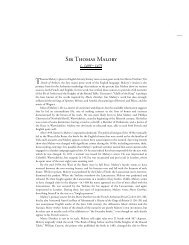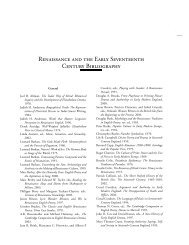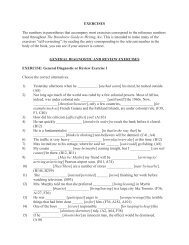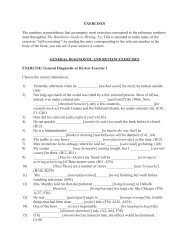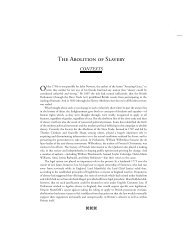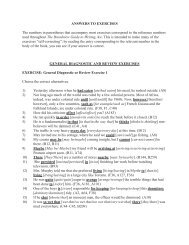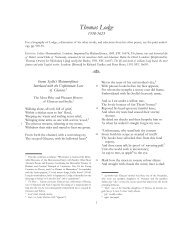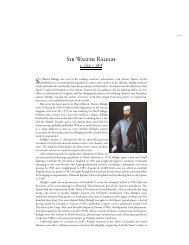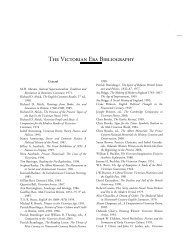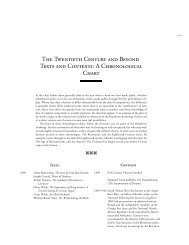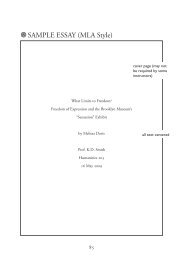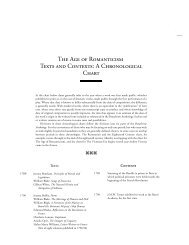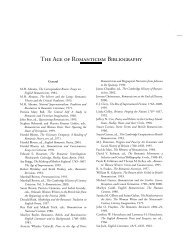Medieval Period Bibliography
Medieval Period Bibliography
Medieval Period Bibliography
Create successful ePaper yourself
Turn your PDF publications into a flip-book with our unique Google optimized e-Paper software.
<strong>Medieval</strong> <strong>Period</strong> <strong>Bibliography</strong><br />
General<br />
Michael Alexander, A History of Old English Literature,<br />
2 nd ed. 2002.<br />
Albert C. Baugh and Thomas Cable, A History of the<br />
English Language, 4 th ed., 1993.<br />
Cordelia Beattie, The <strong>Medieval</strong> Household in Christian<br />
Europe c. 850–1550: Managing Power, Wealth and<br />
the Body, 2003.<br />
Susan Brown, Patricia Clements, and Isobel Grundy,<br />
eds., Orlando: Women Writers in the British Isles from<br />
the Beginnings to the Present, 2006.<br />
James Campbell, ed., The Anglo-Saxons, 1981.<br />
M.T. Clanchy, From Memory to Written Record:<br />
England 1066–1307, 2 nd ed., 1993.<br />
John Cox and David Scott Kastan, eds., A New History<br />
of Early English Drama, 1997.<br />
Ernst Robert Curtius, European Literature and the Latin<br />
Middle Ages, 1953.<br />
Wendy Davis, ed., The Short Oxford History of the<br />
British Isles: From the Vikings to the Normans, 2003.<br />
Carolyn Dinshaw and David Wallace, eds., The Cambridge<br />
Companion to <strong>Medieval</strong> Women’s Writing,<br />
2003.<br />
Georges Duby, The Knight, The Lady, and the Priest:<br />
The Making of Modern Marriage in <strong>Medieval</strong> France,<br />
1983.<br />
Georges Duby, The Three Orders: Feudal Society<br />
Imagined, 1978.<br />
Christopher Dyer, Making a Living in the Middle Ages:<br />
The People of Britain 850–1520, 2002.<br />
A.S.G. Edwards, ed., Middle English Prose: A Critical<br />
Guide to Major Authors and Genres, 1984. [new ed.]<br />
Malcolm Godden and Michael Lapidge, eds., The<br />
Cambridge Companion to Old English Literature,<br />
1991.<br />
Matthew Boyd Goldie, ed., Middle English Literature: A<br />
Historical Sourcebook, 2003.<br />
Ralph Griffiths, ed., The Short Oxford History of the<br />
British Isles: The Fourteenth and Fifteenth Centuries,<br />
2003.<br />
Gordon Kipling, Enter the King: Theatre, Liturgy, and<br />
Ritual in the <strong>Medieval</strong> Civic Triumph, 1998.<br />
Roberta L. Krueger, ed., The Cambridge Companion to<br />
<strong>Medieval</strong> Romance, 2000.<br />
Michael Lapidge, John Blair, Simon Keynes, and<br />
Donald Scragg, eds., The Blackwell Encyclopaedia of<br />
Anglo-Saxon England, 1999.<br />
C.S. Lewis, The Discarded Image: An Introduction to<br />
<strong>Medieval</strong> and Renaissance Literature, 1964.<br />
Roger Sherman Loomis, Arthurian Literature in the<br />
Middle Ages: A Collaborative History, 1959.<br />
David Luscombe, ed., The New Cambridge <strong>Medieval</strong><br />
History, 2004.<br />
Rosamond McKitterick, ed., The Uses of Literacy in<br />
Early <strong>Medieval</strong> Europe, 1990.<br />
Bruce Mitchell, An Invitation to Old English and Anglo-<br />
Saxon England, 1995.<br />
R.I. Moore, The First European Revolution, c. 970–1215,<br />
2000.<br />
Derek Pearsall, Old English and Middle English Poetry,<br />
1977.<br />
David A. E. Pelteret, ed., Anglo-Saxon History: Basic<br />
Readings, 2000.<br />
F.P. Pickering, Literature and Art in the Middle Ages,<br />
1970.<br />
Philip Pulsiano and Elaine Treharne, ed., A Companion<br />
to Anglo-Saxon Literature, 2001.<br />
Barbara H. Rosenwein, A Short History of the Middle<br />
Ages, 2 nd ed., 2004.<br />
Peter Speed, ed., Those Who Prayed: An Anthology of<br />
<strong>Medieval</strong> Sources, 1997.<br />
F.M. Stenton, Anglo-Saxon England. 3 rd ed.,1971.<br />
David Wallace, ed., The Cambridge History of <strong>Medieval</strong><br />
English Literature, 1999.<br />
Michael Wood, Domesday: A Search for the Roots of<br />
England, 1986.
2 Broadview Anthology of British Literature<br />
Ælfric of Eynsham<br />
Text: For this anthology material has been newly<br />
translated by R.M. Liuzza.<br />
Editions:<br />
Peter Clemoes, ed., Ælfric’s Catholic Homilies: The First<br />
Series, Text, 1997.<br />
S.J. Crawford, ed., The Old English Version of the<br />
Hexateuch, Ælfric’s Treatise on the Old and New<br />
Testament and his Preface to Genesis, 1922, 1969.<br />
Malcolm Godden, ed., Ælfric’s Catholic Homilies:<br />
Introduction, Commentary and Glossary, 2000.<br />
Malcolm Godden, ed., Ælfric’s Catholic Homilies: the<br />
Second Series. Text, 1979.<br />
G.I. Needham, ed., Lives of Three English Saints: Ælfric,<br />
rev. ed., 1976.<br />
W.W. Skeat, Ælfric’s Lives of Saints: Being a Set of<br />
Sermons on Saints’ Days Formerly Observed by the<br />
English Church. reprint as two volumes, 1966.<br />
Jonathan Wilcox, ed., Ælfric’s Prefaces, 1994.<br />
Translations:<br />
Carmen Acevedo Butcher, God of Mercy: Ælfric’s<br />
Sermons and Theology, 2006.<br />
Benjamin Thorpe, ed., The Homilies of the Anglo-Saxon<br />
Church: The First Part Containing the Sermones<br />
Catholici or Homilies of Aelfric, 1844.<br />
Bibliographies:<br />
Aaron Kleist, “An Annotated <strong>Bibliography</strong> of Ælfrician<br />
Studies: 1983–1996,” Old English Prose: Basic<br />
Readings, ed. Paul E. Szarmach, 2000: 503–52.<br />
Luke M. Reinsma, Ælfric: An Annotated <strong>Bibliography</strong>,<br />
1987.<br />
Studies:<br />
Janet Bately, “The Nature of Old English Prose,” The<br />
Cambridge Companion to Old English Literature, ed.<br />
Malcolm Godden and Michael Lapidge, 1991: 71-<br />
87.<br />
Michael Benskin, “The Literary Structure of Ælfric’s<br />
Life of King Edmund,” Loyal Letters: Studies on<br />
Mediaeval Alliterative Poetry and Prose, ed. L.A.J.R.<br />
Houwen and A.A. MacDonald, 1994: 1–27.<br />
Peter A.M. Clemoes, “The Chronology of Ælfric’s<br />
Works,” The Anglo-Saxons: Studies in Some Aspects of<br />
their History and Culture Presented to Bruce Dickens,<br />
ed. Peter A.M. Clemoes, 1959.<br />
Milton McC Gatch, Preaching and Theology in Anglo-<br />
Saxon England: Ælfric and Wulfstan, 1977.<br />
M.R. Godden, “Ælfric and the Vernacular Prose<br />
Tradition,” The Old English Homily and its Backgrounds,<br />
ed. P. Szarmach and B. Huppé, 1978:<br />
99–117.<br />
M.R. Godden, “Experiments in Genre: the Saints’ Lives<br />
in Ælfric’s Catholic Homilies,” Holy Men and Holy<br />
Women: Old English Prose Saints’ Lives and their<br />
Contexts, ed. Paul E. Szarmach, 1996: 261–87.<br />
Antonia Gransden, “Abbo of Fleury’s Passio Sancti<br />
Eadmundi,” Revue Bénédictine 105, 1995: 20–78, ill.<br />
Mark Griffith, “Ælfric’s Preface to Genesis: Genre,<br />
Rhetoric and the Origins of the Ars dictaminis,”<br />
Anglo-Saxon England 29, 2000: 215–34.<br />
Joyce Hill, “Reform and Resistance: Preaching Styles in<br />
Late Anglo-Saxon England,” De l’homélie au sermon:<br />
histoire de la prédication médiévale, ed. Jacqueline<br />
Hamesse and Xavier Hermand, 1993: 15–46.<br />
Bernard F. Huppé, “Alfred and Ælfric: a Study of Two<br />
Prefaces,” The Old English Homily and its<br />
Backgrounds, ed. P. Szarmach and B. Huppé, 1978:<br />
119–37.<br />
James R. Hurt, Ælfric, 1972.<br />
Eric John, “The World of Abbot Ælfric,” Ideal and<br />
Reality in Frankish and Anglo-Saxon Society: Studies<br />
Presented to J. M. Wallace-Hadrill, ed. Patrick<br />
Wormald, with Donald Bullough and Roger<br />
Collins, 1983: 300–16.<br />
R.M. Liuzza, “Who Read the Gospels in Old English?”<br />
Words and Works: Studies in <strong>Medieval</strong> English<br />
Language and Literature in Honour of Fred C.<br />
Robinson, ed. Nicholas Howe and Peter S. Baker,<br />
1998: 3–24.<br />
Richard Marsden, “Ælfric as Translator: the Old<br />
English Prose Genesis,” Anglia 109, 1991: 319–58.<br />
Robert Stanton, The Culture of Translation in Anglo-<br />
Saxon England, , 2002.<br />
Jocelyn Wogan-Browne, “The Hero in Christian<br />
Reception: Ælfric and Heroic Poetry,” La funzione<br />
dell’eroe germanico: storicità, metafora, paradigma.
Atti del Convegno internazionale di studio, Roma, 6–8<br />
maggio 1993, ed. Teresa Pàroli, 1995: 323–46.<br />
Alfred the Great<br />
Text: For this anthology the Sweet translation from<br />
the Old English has been used.<br />
Editions:<br />
Carolin Schreiber, King Alfred’s Old English Translation<br />
of Pope Gregory the Great’s ‘Regula Pastoralis’ and its<br />
Cultural Context, 2002.<br />
Henry Sweet, ed. and trans., King Alfred’s West-Saxon<br />
Version of Gregory’s Pastoral Care, 1871.<br />
Bibliographies:<br />
Nicole Guenther Discenza, “Alfred the Great: a<br />
<strong>Bibliography</strong> with Special Reference to Literature,”<br />
Old English Prose: Basic Readings, ed. Paul E. Szarmach,<br />
2000.<br />
Gregory Waite, Old English Prose Translations of King<br />
Alfred’s Reign, 2000.<br />
Criticism:<br />
Richard Abels, Alfred the Great: War, Kingship and<br />
Culture in Anglo-Saxon England, 1998.<br />
Janet M. Bately, The Literary Prose of King Alfred’s<br />
Reign: Translation or Transformation?, 1980.<br />
Kathleen Davis, “The Performance of Translation<br />
Theory in King Alfred’s National Literary Program,”<br />
Manuscript, Narrative, Lexicon: Essays on Literary<br />
and Cultural Transmission in Honor of Whitney F.<br />
Bolton, ed. Robert Boenig and Kathleen David,<br />
2000: 149–70.<br />
Nicole Guenther Discenza, “Wealth and Wisdom:<br />
Symbolic Capital and the Ruler in the Transnational<br />
Program of Alfred the Great,” Exemplaria 13, 2001:<br />
433–67.<br />
Sarah Foot, “The Making of Angelcynn: English Identity<br />
Before the Norman Conquest,” Old English<br />
Literature: Critical Essays, ed. M.J. Toswell, 2002:<br />
51–78.<br />
Allen J. Frantzen, King Alfred, 1986.<br />
<strong>Medieval</strong> <strong>Period</strong> <strong>Bibliography</strong> 3<br />
M.R. Godden, “King Alfred’s Preface and the Teaching<br />
of Latin in Anglo-Saxon England,” English History<br />
Review 117, 2002: 596–604.<br />
Bernard F. Huppé, “Alfred and Ælfric: a Study of Two<br />
Prefaces,” The Old English Homily and its<br />
Backgrounds, ed. P. Szarmach and B. Huppé, 1978:<br />
119–37.<br />
Simon Keynes and Michael Lapidge, trans., Alfred the<br />
Great: Asser’s ‘Life of King Alfred’ and Other<br />
Contemporary Sources, 1983.<br />
Jennifer Morrish, “King Alfred’s Letter as a Source on<br />
Learning in England in the Ninth Century,” Studies in<br />
Earlier Old English Prose, ed. Paul E. Szarmach, 1986:<br />
87–107.<br />
E.G. Stanley, “King Alfred’s Prefaces,” Review of English<br />
Studies 39, 1988: 349–64.<br />
Paul E. Szarmach, “The Meaning of Alfred’s Preface to<br />
the Pastoral Care,” Mediaevalia 6, 1982: 57–86.<br />
The Anglo-Saxon Chronicle<br />
Text: The text prepared by R.M. Liuzza for this volume<br />
draws on various manuscripts: most entries follow the<br />
text of the Peterborough Chronicle (known to<br />
scholars as E) or the Winchester Text (A). The translation<br />
draws heavily on those by Ingram and Giles;<br />
the Swanton Translation has also been consulted.<br />
Editions and translations:<br />
Janet M. Bately, ed., The Anglo-Saxon Chronicle: MS A,<br />
1986.<br />
J.A. Giles, ed. and trans., The Anglo-Saxon Chronicle,<br />
1847.<br />
James Ingram, ed. and trans., The Anglo-Saxon<br />
Chronicle, 1823.<br />
Michael Swanton, ed. and trans., The Anglo-Saxon<br />
Chronicles, rev. ed., 2000.<br />
Criticism:<br />
Janet M. Bately, “Manuscript Layout and the Anglo-<br />
Saxon Chronicle,” Bulletin of the John Rylands<br />
University Library of Manchester 70, 1988: 21–43.
4 Broadview Anthology of British Literature<br />
Janet M. Bately, “The Compilation of the Anglo-Saxon<br />
Chronicle, 60 BC to AD 890: Vocabulary as<br />
Evidence,” Proceedings of the British Academy 64,<br />
1980: 93–129.<br />
Janet M. Bately, “The Compilation of the Anglo-Saxon<br />
Chronicle Once More,” Sources and Relations: Studies<br />
in Honour of J. E. Cross, ed. Marie Collins, Jocelyn<br />
Price, and Andrew Hamer, 1985: 7–26.<br />
Thomas A. Bredehoft, Textual Histories: Readings in the<br />
“Anglo-Saxon Chronicle,” 2001.<br />
David Dumville, “What is a Chronicle?” The <strong>Medieval</strong><br />
Chronicle II: Proceedings of the 2nd International<br />
Conference on the <strong>Medieval</strong> Chronicle Driebergen /<br />
Utrecht 16–21 July 1999, ed. Erik Kooper, 2002:<br />
1–27.<br />
Sarah Foot, “Remembering, Forgetting and Inventing:<br />
Attitudes to the Past in England at the End of the<br />
First Viking Age,” Transactions of the Royal Histical<br />
Society, 1999: 185–200.<br />
Antonia Gransden, Historical Writing in England, c. 550<br />
–1307, 1974.<br />
Kenneth Harrison, “Early Wessex Annals in the Anglo-<br />
Saxon Chronicle,” English Historical Review, 86,<br />
1971: 527–33.<br />
Richard P. Horvath, “History, Narrative, and the<br />
Ideological Mode of The Peterborough Chronicle,”<br />
Mediaevalia 17, 1994: 123–48.<br />
Nicholas Howe, “An Angle on This Earth: Sense of<br />
Place in Anglo-Saxon England,” Bull. of the John<br />
Rylands Univ. Lib. of Manchester 82, 2000: 3–27.<br />
Anton Scharer, “The Writing of History at King<br />
Alfred’s Court,” Early <strong>Medieval</strong> Europe, 1996:<br />
177–206.<br />
Alice Sheppard, Families of the King: Writing Identity in<br />
the Anglo-Saxon Chronicle, 2004.<br />
The Battle of Maldon<br />
Text: The poem has been newly translated by R.M.<br />
Liuzza for this anthology.<br />
Editions:<br />
E.V. Gordon, ed., The Battle of Maldon, rev. ed., 1976.<br />
D.G., Scragg, ed., The Battle of Maldon, 1981.<br />
<strong>Bibliography</strong>:<br />
Wendy E.J. Collier, “A <strong>Bibliography</strong> of the Battle of<br />
Maldon,” The Battle of Maldon, AD 991, ed. Donald<br />
Scragg, 1991: 294–301. Also online at <br />
Criticism:<br />
W.G. Busse, and R. Holtei, “The Battle of Maldon: A<br />
Historical, Heroic and Political Poem,”<br />
Neophilologus 65, 1981: 614–21.<br />
Christopher M. Cain, “The ‘Fearful Symmetry’ of<br />
Maldon: The Apocalypse, the Poet, and the<br />
Millennium,” Comitatus 28, 1997: 1–16.<br />
Janet Cooper, ed., The Battle of Maldon: Fiction and<br />
Fact, 1993.<br />
Craig R. Davis, “Cultural Historicity in The Battle of<br />
Maldon,” Philological Quarterly 78, 1999: 151–69.<br />
Paul Dean, “History Versus Poetry: The Battle of<br />
Maldon,” Neuphilologische Mitteilungen 93, 1992:<br />
99–108.<br />
Roberta Frank, “The Battle of Maldon and Heroic<br />
Literature,” The Battle of Maldon, AD 991, ed.<br />
Donald Scragg, 1991: 196–207.<br />
Roberta Frank, “The Ideal of Men Dying with their<br />
Lord in The Battle of Maldon: Anachronism or<br />
nouvelle vague?” People and Places in Northern Europe<br />
500–1600: Essays in Honour of Peter Hayes Sawyer,<br />
ed. Ian Wood and Niels Lund, 1991: 95–106.<br />
John M. Hill, “Transcendental Loyalty in The Battle of<br />
Maldon,” Mediaevalia 17, 1994: 67–88.<br />
John M. Hill, The Anglo-Saxon Warrior Ethic: Reconstructing<br />
Lordship in Early English Literature, 2000.<br />
Simon Keynes, “The Historical Context of the Battle of<br />
Maldon,” The Battle of Maldon AD 991, ed. Donald<br />
Scragg, 1991: 81–113.<br />
John D. Niles, “Maldon and Mythopoesis,” Mediaevalia<br />
17, 1994: 89–121.<br />
Mary P. Richards, “The Battle of Maldon in its<br />
Manuscript Context,” Mediaevalia 7, 1984: 79–89.<br />
Fred C. Robinson, “God, Death, and Loyalty in The<br />
Battle of Maldon,” J.R.R. Tolkien, Scholar and<br />
Storyteller: Essays in Memoriam, ed. Mary Salu and<br />
Robert T. Farrell, 1979: 76–98.<br />
Fred C. Robinson, “Some Aspects of the Maldon Poet’s
Artistry,” Journal of English and Germanic Poetry 75,<br />
1976: 25–40.<br />
Donald Scragg, ed., The Battle of Maldon AD 991,<br />
1991.<br />
Rosemary Woolf, “The Ideal of Men Dying with their<br />
Lord in the Germania and in The Battle of Maldon,”<br />
Anglo-Saxon England 5, 1976: 63–81.<br />
Bede’s Ecclesiastical History and Cædmon’s Hymn<br />
Text: Selections have been translated for this volume<br />
from the Latin by R.M. Liuzza; previous translations<br />
have been consulted.<br />
Editions:<br />
Bertram Colgrave and R.A.B. Mynors, eds. and trans.,<br />
Bede’s Ecclesiastical History of the English People, 1969.<br />
Daniel O’Donnell, Cædmon’s Hymn: A Multi-media<br />
Study, Edition and Archive, 2005. [book + CD-<br />
ROM.]<br />
Translations:<br />
J.A. Giles ed., L. Stevens, trans., with notes by L.C.<br />
Jane, Bede’s Ecclesiastical History of the English<br />
Nation, 1910.<br />
Leo Sherley-Price and D.H. Farmer, trans., Bede.<br />
Ecclesiastical History of the English People, with Bede’s<br />
Letter to Egbert and Cuthbert’s Letter on the Death of<br />
Bede, rev. ed., 1990.<br />
Criticism:<br />
Peter Hunter Blair, Northumbria in the Days of Bede,<br />
1976.<br />
Peter Hunter Blair, The World of Bede, rev. ed., 1990.<br />
George Hardin Brown, “The Age of Bede,” Anglo-Latin<br />
in the Context of Old English Literature, ed. Paul E.<br />
Szarmach, 1983: 1–6.<br />
George Hardin Brown, Bede the Venerable, 1987.<br />
George Hardin Brown, “Royal and Ecclesiastical<br />
Rivalries in Bede’s History,” Renascence 52.1, 1999:<br />
19–33.<br />
Paul Cavill, “Bede and Cædmon’s Hymn,” “Lastworda<br />
Betst”: Essays in Memory of Christine E. Fell with Her<br />
Unpublished Writings, ed. Carole Hough and<br />
<strong>Medieval</strong> <strong>Period</strong> <strong>Bibliography</strong> 5<br />
Kathryn A. Lowe, 2002.<br />
Walter Goffart, The Narrators of Barbarian History<br />
(A.D. 550–800): Jordanes, Gregory of Tours, Bede,<br />
and Paul the Deacon, 1988.<br />
Jane Hawkes, The Golden Age of Northumbria, 1996.<br />
N.J. Higham, An English Empire: Bede and the Early<br />
Anglo-Saxon Kings, 1995.<br />
N.J. Higham, The Convert Kings: Power and Religious<br />
Affiliation in Early Anglo-Saxon England, 1997.<br />
Kevin S. Kiernan, “Reading Cædmon’s ‘Hymn’ with<br />
Someone Else’s Glosses,” Old English Literature:<br />
Critical Essays, ed. R.M. Liuzza, 2002: 103–24.<br />
Clare A. Lees and Gillian R. Overing, “Birthing Bishops<br />
and Fathering Poets: Bede, Hild, and the Relations<br />
of Cultural Production,” Exemplaria 6, 1994:<br />
35–65.<br />
Henry Mayr-Harting, The Coming of Christianity to<br />
Anglo-Saxon England, 3 rd ed., 1991.<br />
Katherine O’Brien O’Keeffe, “Orality and the Developing<br />
Text of Cædmon’s Hymn,” Speculum 62, 1987:<br />
1–20.<br />
Andy Orchard, “Poetic Inspiration and Prosaic Translation:<br />
The Making of Cædmon’s Hymn,” Studies in<br />
English Language and Literature: “Doubt Wisely”:<br />
Papers in Honour of E. G. Stanley, ed. M.J. Toswell<br />
and E.M. Tyler, 1996: 402–22.<br />
P.R. Orton, “Cædmon and Christian Poetry,” Neuphilologische<br />
Mitteilungen 84, 1983: 163–10.<br />
Robert W. Hanning, The Vision of History in Early<br />
Britain, 1966.<br />
Joel T. Rosenthal, “Bede’s Use of Miracles in The<br />
Ecclesiastical History,” Traditio 31, 1975: 328–35.<br />
J.M. Wallace-Hadrill, Bede’s Ecclesiastical History of the<br />
English People: a Historical Commentary, 1988.<br />
Benedicta Ward, “Miracles and History: A Reconsideration<br />
of the Miracle Stories Used by Bede,”<br />
Famulus Christi: Essays in Commemoration of the<br />
Thirteenth Centenary of the Birth of the Venerable<br />
Bede, ed. Gerald Bonner, 1976: 70–76.<br />
Benedicta Ward, The Venerable Bede, rev. ed., 1998.<br />
Patrick Wormald, “Bede, Beowulf and the Conversion<br />
of the Anglo-Saxon Aristocracy,” Bede and Anglo-<br />
Saxon England: Papers in Honour of the 1300th<br />
Anniversary of the Birth of Bede, Given at Cornell<br />
University in 1973 and 1974, ed. R.T. Farrell, 1978.
6 Broadview Anthology of British Literature<br />
Patrick Wormald, “Bede, the Bretwaldas and the<br />
Origins of the Gens Anglorum,” Ideal and Reality in<br />
Frankish and Anglo-Saxon Society: Studies Presented<br />
to J. M. Wallace-Hadrill, ed. Patrick Wormald,<br />
1983.<br />
Beowulf<br />
Text: The translation used is that of R.M. Liuzza.<br />
Editions:<br />
George Jack, ed., “Beowulf”: A Student Edition, rev. ed.,<br />
1997.<br />
Kevin Kiernan, Andrew Prescott, et al. Electronic<br />
“Beowulf,” 1999. [2 CD-ROMs.]<br />
Friedrich Klaeber, Beowulf and the Fight at Finnsburgh,<br />
3 rd ed., 1950.<br />
Bruce Mitchell and Fred C. Robinson, eds., “Beowulf”:<br />
An Edition with Relevant Shorter Texts, 1998.<br />
C.L. Wrenn, ed., Beowulf: With the Finnesburg<br />
Fragment, rev. ed., 1973.<br />
Translations:<br />
Michael Alexander, trans., Beowulf: A Verse Translation,<br />
2001.<br />
Howell D. Chickering, trans., Beowulf: A Dual-<br />
Language Edition, 2006.<br />
Stanley B. Greenfield, trans., A Readable “Beowulf”: The<br />
Old English Epic Newly Translated, 1982.<br />
Seamus Heaney, trans., Beowulf, 1999.<br />
Marc Hudson, ed. and trans., “Beowulf”: A Translation<br />
and Commentary, 1990.<br />
Roy Liuzza, ed. and trans., Beowulf, 1999.<br />
Randolph Swearer, Raymond Oliver, and Marijane<br />
Osborn, trans., Beowulf: A Likeness, 1990.<br />
Bibliographies:<br />
Robert J. Hasenfratz, “Beowulf” Scholarship: An Annotated<br />
<strong>Bibliography</strong>, 1979–1990, 1993.<br />
Douglas D. Short, “Beowulf” Scholarship: An Annotated<br />
<strong>Bibliography</strong>, 1980.<br />
Criticism:<br />
Peter S. Baker, ed., The Beowulf Reader, 1995.<br />
Robert E. Bjork, and John Niles, ed., A Beowulf<br />
Handbook, 1997.<br />
Colin Chase, ed., The Dating of Beowulf, rev. ed., 1997.<br />
James W. Earl, Thinking About “Beowulf,” 1994.<br />
Roberta Frank, “The Beowulf Poet’s Sense of History,”<br />
The Wisdom of Poetry: Essays in Early English Literature<br />
in Honor of Morton W. Bloomfield, ed. Larry D.<br />
Benson and Siegfried Wenzel, 1982: 53–65, 271–77.<br />
R.D. Fulk, ed., Interpretations of “Beowulf”: A Critical<br />
Anthology, 1991.<br />
Robert W. Hanning, “Beowulf as Heroic History,”<br />
<strong>Medieval</strong>ia et Humanistica 5, 1974: 77–102.<br />
Kevin S. Kiernan, “Beowulf” and the “Beowulf” Manuscript,<br />
rev. ed., 1996.<br />
R.M. Liuzza, “Beowulf: Monuments, Memory,<br />
History,” Readings in <strong>Medieval</strong> Texts: Interpreting<br />
Old and Middle English Literature, ed. Elaine<br />
Treharne and David Johnson, 2005: 91–108.<br />
J.D. Niles, Beowulf: The Poem and its Tradition, 1983.<br />
Andy Orchard, A Critical Companion to “Beowulf,”<br />
2003.<br />
Gillian R. Overing, Language, Sign, and Gender in<br />
“Beowulf,” 1990.<br />
Fred C. Robinson, “Beowulf” and the Appositive Style,<br />
1985.<br />
T.A. Shipping, Beowulf, 1978.<br />
The Blickling Homilies<br />
Text: The translation used in this anthology, by R.M.<br />
Liuzza, is adapted from that of R. Morris.<br />
Editions and translations:<br />
Richard J. Kelly, ed., The Blickling Homilies, 2003.<br />
R. Morris, ed. The Blickling Homilies, 1874–80.<br />
Rudolph Willard, The Blickling Homilies: The John H.<br />
Scheide Library, Titusville, Pennsylvania, 1960.<br />
Bibliographies:<br />
Janet M. Bately, Anonymous Old English Homilies: A<br />
Preliminary <strong>Bibliography</strong> of Source Studies, 1993. Alo<br />
online at http://www.wmich.edu/medieval/research/<br />
rawl/homilies/home.htm.
Criticism:<br />
Robin Ann Aronstam, “The Blickling Homilies: a<br />
Reflection of Popular Anglo-Saxon Belief,” Law,<br />
Church, and Society: Essays in Honor of Stephan<br />
Kuttner, ed. Kenneth Pennington and Robert<br />
Somerville, 1977: 271–80.<br />
J.E. Cross, “Vernacular Sermons in Old English,” The<br />
Sermon, ed. Beverly Mayne Kienzle, 2000: 561–96.<br />
Marcia A. Dalbey, “Themes and Techniques in the<br />
Blickling Lenten Homilies,” The Old English Homily<br />
and its Backgrounds, ed. P. Szarmach and B. Huppé,<br />
1978: 221–39.<br />
Julia Dietrich, “The Liturgical Context of Blickling<br />
Homily X,” American Notes and Queries 18, 1980:<br />
138–39.<br />
Robert DiNapoli, An Index of Theme and Image to the<br />
Homilies of the Anglo-Saxon Church, 1995.<br />
Milton McC. Gatch, “The Unknowable Audience of<br />
the Blickling Homilies,” Anglo-Saxon England 18,<br />
1989: 99–115.<br />
Joyce Hill, “Monastic Reform and the Secular Church,”<br />
England in the Eleventh Century: Proceedings of the<br />
1990 Harlaxton Symposium, ed. Carola Hicks, 1992:<br />
103–17.<br />
J. Elizabeth Jeffrey, Blickling Spirituality and the Old<br />
English Vernacular Homily: A Textual Analysis, 1989.<br />
D.R. Letson, “The Form of the Old English Homily,”<br />
American Benedictine Review 30, 1979: 399–431.<br />
Alex Nicholls, “The Corpus of Prose Saints’ Lives and<br />
Hagiographic Pieces in Old English and its<br />
Manuscript Distribution,” Reading <strong>Medieval</strong> Studies<br />
20, 1994: 51–87.<br />
Alexandra Olsen, “The Homiletic Tradition in Old<br />
English,” In Geardagum 18, 1997: 1–13.<br />
Ingrid Ranum, “Blickling Homily X and the Millennial<br />
Apocalyptic Vision,” In Geardagum 19, 1998:<br />
41–49.<br />
D.G. Scragg, “The Corpus of Vernacular Homilies and<br />
Prose Saints’ Lives Before Ælfric,” Anglo-Saxon<br />
England 8, 1979: 223–77.<br />
D.G. Scragg, “The Homilies of the Blickling<br />
Manuscript,” Learning and Literature in Anglo-Saxon<br />
England: Studies Presented to Peter Clemoes on the<br />
Occasion of his Sixty-Fifth Birthday, ed. Michael<br />
Lapidge and Helmut Gneuss, 1985: 299–316.<br />
<strong>Medieval</strong> <strong>Period</strong> <strong>Bibliography</strong> 7<br />
D.G. Scragg, Dating and Style in Old English Composite<br />
Homilies, 1999.<br />
Paul E.Szarmach and Bernard F. Huppé, eds., The Old<br />
English Homily and its Backgrounds, 1978.<br />
Geoffrey Chaucer<br />
Text: This anthology uses text and notes prepared by<br />
Robert Boenig and Andrew Taylor for their<br />
forthcoming Broadview edition. Boenig and Taylor<br />
work mainly from the Ellesmere but they draw<br />
attention in their notes to significant variants.<br />
Editions:<br />
Robert Boeing and Andrew Taylor, eds., The Canterbury<br />
Tales, 2007.<br />
A.C. Cawley, ed., The Canterbury Tales, 1991.<br />
Larry D. Benson et al., eds., The Riverside Chaucer,<br />
1987.<br />
E. Talbot Donaldson, ed., Chaucer’s Poetry: An Anthology<br />
for the Modern Reader, 1958.<br />
Paul G. Ruggiers and Donald M. Rose, eds., The<br />
Facsimile Series of the Works of Geoffrey Chaucer,<br />
1980–87.<br />
Biographies:<br />
Derek Brewer, Chaucer in his Time, 1964.<br />
Derek Pearsall, The Life of Geoffrey Chaucer: A Critical<br />
Biography, 1992.<br />
Velma Bourgeois Richmond, Geoffrey Chaucer, 1992.<br />
Criticism:<br />
Piero Boitani, ed., The Cambridge Chaucer Companion,<br />
1986.<br />
Helen Cooper, ed., The Oxford Guides to Chaucer: The<br />
Canterbury Tales, 2 nd ed., 1996.<br />
Carolyn Dinshaw, Chaucer’s Sexual Poetics, 1989.<br />
Steve Ellis, ed., Chaucer: An Oxford Guide, 2005.<br />
Douglas Gray, ed., The Oxford Companion to Chaucer,<br />
2003.<br />
Seth Lerer, ed., The Yale Companion to Chaucer, 2006.<br />
Lee Patterson, Chaucer and the Subject of History, 1991.<br />
Derek Pearsall, ed., The Canterbury Tales, 1985.
8 Broadview Anthology of British Literature<br />
D.W. Robertson, A Preface to Chaucer: Studies in<br />
<strong>Medieval</strong> Perspectives, 1962.<br />
Beryl Rowland, ed., Companion to Chaucer Studies,<br />
1979.<br />
Paul Strohm, Social Chaucer, 1989.<br />
Contexts: The Crises of the Fourteenth Century<br />
John Alberth, From the Brink of the Apocalypse: Confronting<br />
Famine, War, Plague, and Death in the Later<br />
Middle Ages, 2001.<br />
C.T. Allmand, ed., War, Literature, and Politics in the<br />
Late Middle Ages, 1976.<br />
Emilie Amt, ed., <strong>Medieval</strong> England, 1000–1500: A<br />
Reader, 2000.<br />
Norman F. Cantor, In the Wake of the Plague: The Black<br />
Death and the World it Made, 2001.<br />
Ivy Corfis and Michael Wolfe, eds., The <strong>Medieval</strong> City<br />
Under Siege, 1995.<br />
Patrick Geary, ed., Readings in <strong>Medieval</strong> History, 3 rd ed.,<br />
2003.<br />
Ralph Griffiths, ed., The Short Oxford History of the<br />
British Isles: The Fourteenth and Fifteenth Centuries,<br />
2003.<br />
R. Horrox, ed., The Black Death, 1994.<br />
Maurice Hugh Keen, ed., <strong>Medieval</strong> Warfare: A History,<br />
1999.<br />
John Kelly, The Great Mortality: An Intimate History of<br />
the Black Death, the Most Devastating Plague of all<br />
Time, 2005.<br />
Maryanne Kowaleski, ed., <strong>Medieval</strong> Towns: A Reader,<br />
2006.<br />
Barbara Rosenwein, A Short History of the Middle Ages,<br />
2 nd ed., 2004.<br />
John Shinners, ed., <strong>Medieval</strong> Popular Religion,<br />
1000–1500: A Reader, 1997.<br />
Brian Tierney, ed., Sources of <strong>Medieval</strong> History, 5 th ed.,<br />
1992.<br />
Ronald Webber, The Peasants’ Revolts: The Uprising in<br />
Kent, Essex, East Anglia and London in 1381 During<br />
the Reign of King Richard II, 1980.<br />
Contexts: Love and Marriage in <strong>Medieval</strong> Britain<br />
Emilie Amt, ed., <strong>Medieval</strong> England, 1000–1500: A<br />
Reader, 2000.<br />
D.L. d’Avray, <strong>Medieval</strong> Marriage: Symbolism and Society,<br />
2005.<br />
Cristelle Baskins and Sherry Roush, eds., The <strong>Medieval</strong><br />
Marriage Scene: Prudence, Passion, Policy, 2005.<br />
Christopher Brooke, The <strong>Medieval</strong> Idea of Marriage,<br />
1989.<br />
J.D. Burnley, Courtliness and Literature in <strong>Medieval</strong><br />
England, 1998.<br />
Andreas Capellanus, The Art of Courtly Love, trans. and<br />
ed., John Jay Perry, rev. ed., 1990.<br />
Albrecht Classen, ed., Discourses on Love, Marriage, and<br />
Transgression in <strong>Medieval</strong> and Early Modern<br />
Literature, 2004.<br />
Denis De Rougemont, trans. M. Belgion, Love in the<br />
Western World, 1983.<br />
Patrick Geary, ed., Readings in <strong>Medieval</strong> History, 3 rd ed.,<br />
2003.<br />
Ruth Mazo Karras, Sexuality in <strong>Medieval</strong> Europe: Doing<br />
unto Others, 2005.<br />
Conor McCarthy, Marriage in <strong>Medieval</strong> England: Law,<br />
Literature and Practice, 2004.<br />
Linda Mitchell, Portraits of <strong>Medieval</strong> Women: Family,<br />
Marriage, and Politics in England 1225–1350, 2003.<br />
Jacqueline Murray, ed., Love, Marriage, and Family in<br />
the Middle Ages: A Reader, 2001.<br />
Carol Neel, ed., <strong>Medieval</strong> Families: Perspectives on<br />
Marriage, Household, and Children, 2004.<br />
Frederik Pedersen, Marriage Disputes in <strong>Medieval</strong><br />
England, 2000.<br />
Pamela Porter, Courtly Love in <strong>Medieval</strong> Manuscripts,<br />
2003.<br />
Philip Reynolds, Marriage in the Western Church: The<br />
Christianization of Marriage During the Patristic and<br />
Early <strong>Medieval</strong> <strong>Period</strong>s, 2001.<br />
Barbara Rosenwein, A Short History of the Middle Ages,<br />
2 nd ed., 2004.
Contexts: Religious and Spiritual Life<br />
Emilie Amt, ed., <strong>Medieval</strong> England, 1000–1500: A<br />
Reader, 2000.<br />
Malcolm Barber, The Two Cities: <strong>Medieval</strong> Europe,<br />
1050–1320, 1993.<br />
Constance H. Berman, ed., <strong>Medieval</strong> Religion: New<br />
Approaches, 2005.<br />
Nancy Caciola, Discerning Spirits: Divine and Demonic<br />
Possession in the Middle Ages, 2003.<br />
Theresa Coletti, Mary Magdalene and the Drama of<br />
Saints: Theater, Gender, and Religion in Late<br />
<strong>Medieval</strong> England, 2004.<br />
Patrick Geary, ed., Readings in <strong>Medieval</strong> History, 3 rd ed.,<br />
2003.<br />
Bernard Hamilton, Religion in the <strong>Medieval</strong> West, 2003.<br />
Ione Kempe Knight, ed., Wimbledon’s Sermon: Redde<br />
Rationem Villicationis Tue: A Middle English Sermon<br />
of the Fourteenth Century, 1967.<br />
Emmanuel LeRoy Ladurie, Montaillou: The Promised<br />
Land of Error, trans. B. Bray 1979.<br />
Gordon Leffe, Heresy, Philosophy and Religion in the<br />
<strong>Medieval</strong> West, 2002.<br />
Jacques LeGoff, The Birth of Purgatory, trans. A.<br />
Goldhammer, 1984.<br />
Carter Lindberg, A Brief History of Christianity, 2006.<br />
Anneke B. Mulder-Bakker, ed., The Invention of Saintliness,<br />
2002.<br />
Barbara Newman, From Virile Woman to WomanChrist:<br />
Studies in <strong>Medieval</strong> Religion and Literature, 1995.<br />
Barbara Rosenwein, A Short History of the Middle Ages,<br />
2 nd ed., 2004.<br />
John Shinners, ed., <strong>Medieval</strong> Popular Religion, 1000–<br />
1500: A Reader, 1997.<br />
May-Ann Stouck, ed., <strong>Medieval</strong> Saints: A Reader, 1998.<br />
Diana Wood, ed., Women and Religion in <strong>Medieval</strong><br />
England, 2003.<br />
The Cotton Maxims (also known as Maxims II<br />
and as Gnomic Verses )<br />
Text: The translation used is that of Elliot Von Kirk<br />
Dobbie.<br />
<strong>Medieval</strong> <strong>Period</strong> <strong>Bibliography</strong> 9<br />
Editions and translations:<br />
J.K. Bollard, “The Cotton Maxims,” Neophilologus 57,<br />
1973: 179–87.<br />
Elliot Van Kirk Dobbie, ed., The Anglo-Saxon Minor<br />
Poems, 1942.<br />
Katherine O’Brien O’Keeffe, ed. The Anglo-Saxon<br />
Chronicle: A Collaborative Edition, Vol. 5, 2001.<br />
Michael Alexander, ed. and trans., The Earliest English<br />
Poems, 3 rd ed., 1992.<br />
<strong>Bibliography</strong>:<br />
Russell Poole, Old English Wisdom Poetry, Annotated<br />
Bibliographies of Old and Middle English Literature 5,<br />
1998: 204–233.<br />
Criticism:<br />
Nigel F. Barley, “Structure in the Cotton Gnomes,”<br />
Neuphilologische Mitteilungen 78, 1977: 244–49.<br />
J.K. Bollard, “The Cotton Maxims,” Neophilologus 57,<br />
1973: 179–87.<br />
Stanley B. Greenfield and Richard Evert, “Maxims II:<br />
Gnome and Poem,” Anglo-Saxon Poetry: Essays in<br />
Appreciation, For John C. McGalliard, ed. Lewis E.<br />
Nicholson and Dolores Warwick Frese, 1975: 337–54.<br />
Elaine Tuttle Hansen, The Solomon Complex: Reading<br />
Wisdom in Old English Poetry, 1988.<br />
Thomas D. Hill, “Notes on the Old English ‘Maxims’ I<br />
and II,” Notes and Queries 215, 1970: 445–47.<br />
Nicholas Howe, The Old English Catalogue Poems, 1985.<br />
Carolyne Larrington, A Store of Common Sense: Gnomic<br />
Theme and Style in Old Icelandic and Old English<br />
Wisdom Poetry, 1993.<br />
Audrey L. Meaney, “The ides of the Cotton Gnomic<br />
Poem,” Medium Ævum 48, 1979: 23–39.<br />
Fred C. Robinson, “Old English Literature in its Most<br />
Immediate Context,” Old English Literature in<br />
Context, ed. J.D. Niles, 1980: 11–29.<br />
Fred C. Robinson, “Understanding an Old English<br />
Wisdom Verse: Maxims II, Lines 10ff,” The Wisdom<br />
of Poetry: Essays in Early English Literature in Honor<br />
of Morton W. Bloomfield, ed. Larry D. Benson and<br />
Siegfried Wenzel, 1982: 1–11.<br />
Leslie Whitbread, “Two Notes on Minor Old English<br />
Poems,” Studia Neophilologica 20, 1948: 192–98.
10 Broadview Anthology of British Literature<br />
The Dream of the Rood<br />
Texts: The poem has been newly translated for this<br />
anthology by R.M. Liuzza.<br />
Editions:<br />
George P. Krapp, ed., The Vercelli Book, 1932.<br />
Michael Swanton, ed., The Dream of the Rood, rev. ed.,<br />
1996.<br />
Criticism:<br />
Earl R. Anderson, “Liturgical Influence in The Dream of<br />
the Rood,” Neophilologus 73, 1989: 293–304.<br />
Mary Dockray-Miller, “The Feminized Cross of The<br />
Dream of the Rood,” Philological Quarterly 76, 1997:<br />
1–18.<br />
Andrew Galloway, “Dream-Theory in The Dream of the<br />
Rood and The Wanderer,” Review of English Studies<br />
45, 1994: 475–85.<br />
Antonina Harbus, “Dream and Symbol in The Dream<br />
of the Rood,” Nottingham <strong>Medieval</strong> Studies 40, 1996:<br />
1–15.<br />
Julia Bolton Holloway, “‘The Dream of the Rood’ and<br />
Liturgical Drama,” Drama in the Middle Ages:<br />
Comparative and Critical Essays, eds. Clifford<br />
Davidson and John H. Stroupe, 1991: 24–42.<br />
A.D. Horgan, “The Dream of the Rood and Christian<br />
Tradition,” Neuphilologische Mitteilungen 79, 1978:<br />
11–20.<br />
Martin Irvine, “Anglo-Saxon Literary Theory Exemplified<br />
in Old English Poems: Interpreting the Cross<br />
in The Dream of the Rood and Elene,” Style 20, 1986:<br />
157–81.<br />
Edward B. Irving, Jr., “Crucifixion Witnessed, or<br />
Dramatic Interaction in The Dream of the Rood,”<br />
Modes of Interpretation in Old English Literature:<br />
Essays in Honour of Stanley B. Greenfield, ed. Phyllis<br />
Rugg Brown, Georgia Ronan Crampton, and Fred<br />
C. Robinson, 1986: 101–13.<br />
Margaret Jennings, “Rood and Ruthwell: The Power of<br />
Paradox,” English Language Notes 31, 1994: 6–12.<br />
David F. Johnson, “Old English Religious Poetry:<br />
Christ and Satan and The Dream of the Rood,”<br />
Companion to Old English Poetry, ed. Henk Aertsen<br />
and Rolf H. Bremmer, Jr., 1994: 159–87.<br />
Alvin A. Lee, “Toward a Critique of The Dream of the<br />
Rood,” Anglo-Saxon Poetry: Essays in Appreciation,<br />
For John C. McGalliard, ed. Lewis E. Nicholson and<br />
Dolores Warwick Frese, 1975: 163–91.<br />
Sandra McEntire, “The Devotional Context of the<br />
Cross before A. D. 1000,” Sources of Anglo-Saxon<br />
Culture, ed. Paul E. Szarmach, 1986: 345–56.<br />
Éamonn Ó’Carrigáin, “Crucifixion as Annunciation:<br />
The Relation of The Dream of the Rood to the<br />
Liturgy Reconsidered,” English Studies 63, 1982:<br />
487–505.<br />
Éamonn Ó Carragáin, “How Did the Vercelli Collector<br />
Interpret The Dream of the Rood?” Studies in English<br />
Language and Early Literature in Honour of Paul<br />
Christophersen, ed. P. M. Tilling, 1981: 63–104.<br />
Éamonn Ó Carragáin, Ritual and the Rood: Liturgical<br />
Images and the Old English Poems of the Dream of the<br />
Rood Tradition, 2005.<br />
Carol Braun Pasternack, “Stylistic Disjunctions in The<br />
Dream of the Rood,” Anglo-Saxon England 13, 1984:<br />
167–86.<br />
Everyman<br />
Text: Like all modern editions, the text here derives<br />
from the earliest printed text of the play (early<br />
sixteenth century), as reproduced by W.W. Greg,<br />
1904. Spelling and punctuation have been substantially<br />
modernized.<br />
Editions:<br />
A.C. Cawley, ed., Everyman and <strong>Medieval</strong> Miracle Plays,<br />
1990.<br />
Vincent Foster Hopper, ed., <strong>Medieval</strong> Mystery Plays:<br />
Abraham and Issac, Noah’s Flood, The Second<br />
Shepherd’s Play, Morality Plays, The Castle of<br />
Perseverance, Everyman, and the Interludes, 1962.<br />
Gerald E. Bentley, ed., The Development of Drama: An<br />
Anthology, 1950.<br />
David Bevington, ed., <strong>Medieval</strong> Drama, 1975.<br />
Criticism:<br />
Richard Beadle, ed., The Cambridge Companion to<br />
<strong>Medieval</strong> English Theatre, 1994.
John Cunningham, “Comedic and Liturgical Restoration<br />
in Everyman,” Drama in the Middle Ages:<br />
Comparative and Critical Essays, Second Series, eds.<br />
Clifford Davidson and John H. Stroupe, 1990.<br />
W.A. Davenport, Fifteenth-Century English Drama: The<br />
Early Moral Plays and their Literary Relations, 1982.<br />
David Mills, “The Theaters of Everyman,” From Page to<br />
Performance: Essays in Early English Drama, ed. John<br />
A. Alfred, 1995.<br />
Ron Tanner, “Humor in Everyman and the Middle<br />
English Morality Play,” Philological Quarterly 70,<br />
1991: 149–61.<br />
Jerome Taylor, ed., <strong>Medieval</strong> English Drama: Essays<br />
Critical and Contextual, 1972.<br />
Zacharias P. Thundy, “Morality Plays: Mankind and<br />
Everyman,” Old and Middle English Literature, eds.<br />
Jeffrey Helterman and Jerome Mitchell, 1994:<br />
400–04.<br />
D. Jerry White, Early English Drama, Everyman to 1580:<br />
A Reference Guide, 1986.<br />
Exeter Book Elegies: The Wanderer, The Seafarer,<br />
The Wife’s Lament, The Ruin<br />
Text: The poems have been newly translated for this<br />
anthology by R.M. Liuzza.<br />
Editions:<br />
Ida Gordon, ed., The Seafarer, reprint, 1979.<br />
Anne L. Klinck, The Old English Elegies: a Critical<br />
Edition and Genre Study, 1992.<br />
R.F. Leslie, ed., Three Old English Elegies: “The Wife’s<br />
Lament,” “The Husband’s Message,” “The Ruin,”<br />
reprint 1988.<br />
Roy F. Leslie, ed., The Wanderer, reprint, 1985.<br />
Bernard J. Muir, ed., The Exeter Anthology of Old<br />
English Poetry: An Edition of Exeter Dean and<br />
Chapter MS 3501, 2 vols., 1994.<br />
Bibliographies:<br />
Juan C. Conde-Silvestre, “The Wanderer and The<br />
Seafarer: A <strong>Bibliography</strong> 1971–1991,” SELIM 2,<br />
1992: 170–86.<br />
Bernard J. Muir, The Exeter Book: A <strong>Bibliography</strong>, 1992.<br />
<strong>Medieval</strong> <strong>Period</strong> <strong>Bibliography</strong> 11<br />
Criticism:<br />
William Alfred, “The Drama of The Wanderer,” The<br />
Wisdom of Poetry: Essays in Early English Literature in<br />
Honor of Morton W. Bloomfield, ed. Larry D. Benson<br />
and Siegfried Wenzel, 1982: 31–44.<br />
Janet Bately, “Time and the Passing of Time in ‘The<br />
Wanderer’ and Related OE Texts,” Essays and<br />
Studies 37, 1984: 1–15.<br />
Margrét Gunnarsdóttir Champion, “From Plaint to<br />
Praise: Language as Cure in ‘The Wanderer,’” Studia<br />
Neophilologica 69, 1997: 187–202.<br />
Marilynn Desmond, “The Voice of Exile: Feminist<br />
Literary History and the Anonymous Anglo-Saxon<br />
Elegy,” Critical Inquiry 16, 1990: 572–90.<br />
Fiona Gameson and Richard Gameson, “Wulf and<br />
Eadwacer, The Wife’s Lament, and the Discovery of<br />
the Individual in Old English Verse,” Studies in<br />
English Language and Literature. “Doubt Wisely”:<br />
Papers in Honour of E. G. Stanley, ed. M.J. Toswell<br />
and E. M. Tyler, 1996: 457–74.<br />
Martin Green, “Man, Time, and Apocalypse in The<br />
Wanderer, The Seafarer, and Beowulf,” Journal of<br />
English and Germanic Philology 74, 1975: 502–18.<br />
Martin Green, ed., The Old English Elegies: New Essays<br />
in Criticism and Research, 1983: 240.<br />
Martin Green, “Time, Memory, and Elegy in The Wife’s<br />
Lament,” The Old English Elegies: New Essays in<br />
Criticism and Research, ed. Martin Green, 1983:<br />
123–32.<br />
Stanley B. Greenfield, “Sylf, Seasons, Structure and<br />
Genre in The Seafarer,” Anglo-Saxon England 9,<br />
1981: 199–211.<br />
A.D. Horgan, “The Structure of The Seafarer,” Review<br />
of English Studies 30, 1979: 41–49.<br />
Shari Horner, “En/Closed Subjects: The Wife’s Lament<br />
and the Culture of Early <strong>Medieval</strong> Female<br />
Monasticism,” Æstel 2, 1994: 45–61.<br />
Nicholas Howe, “The Landscape of Anglo-Saxon<br />
England: Inherited, Invented, Imagined,” Inventing<br />
<strong>Medieval</strong> Landscapes: Senses of Place in Western<br />
Europe, ed. John Howe and Michael Wolfe, 2002:<br />
91–112.<br />
Kathryn Hume, “The ‘Ruin Motif’ in Old English<br />
Poetry,” Anglia 94, 1976: 339–60.<br />
W.F. Klein, “Purpose and the ‘Poetics’ of The Wanderer
12 Broadview Anthology of British Literature<br />
and The Seafarer,” Anglo-Saxon Poetry: Essays in<br />
Appreciation, For John C. McGalliard, ed. Lewis E.<br />
Nicholson and Dolores Warwick Frese, 1975: 208–<br />
23.<br />
Roy F. Leslie, “The Editing of Old English Poetic<br />
Texts: Questions of Style,” Old English Poetry: Essays<br />
on Style, ed. Daniel G. Calder, 1979: 111–25.<br />
Roy F. Leslie, “The Meaning and Structure of The<br />
Seafarer,” The Old English Elegies: New Essays in<br />
Criticism and Research, ed. Martin Green, 1983:<br />
96–122.<br />
R.M. Liuzza, “The Tower of Babel: The Wanderer and<br />
the Ruins of History,” Studies in the Literary<br />
Imagination 36, 2003: 1–35<br />
Karma Lochrie, “Wyrd and the Limits of Human<br />
Understanding: A Thematic Sequence in the Exeter<br />
Book,” Journal of English and Germanic Philology 85,<br />
1986: 323–31.<br />
María José Mora, “The Invention of the Old English<br />
Elegy,” English Studies 76, 1995: 129–39.<br />
Andy Orchard, “Re-reading The Wanderer: The Value<br />
of Cross-References,” Via Crucis: Essays on Early<br />
<strong>Medieval</strong> Sources and Ideas in Memory of J.E. Cross,<br />
ed. Thomas N. Hall, 2002: 1–26.<br />
Peter Orton, “The Form and Structure of The Seafarer,”<br />
Studia Neophilologica 63, 1991: 37–55.<br />
Carol Braun Pasternack, “Anonymous Polyphony and<br />
The Wanderer’s Textuality,” Anglo-Saxon England<br />
20, 1991: 99–122.<br />
Carol Braun Pasternack, The Textuality of Old English<br />
Poetry, 1995.<br />
Alain Renoir, “A Reading Context for The Wife’s<br />
Lament,” Anglo-Saxon Poetry: Essays in Appreciation,<br />
For John C. McGalliard, ed. Lewis E. Nicholson and<br />
Dolores Warwick Frese, 1975: 224–41.<br />
Gerald Richman, “Speaker and Speech Boundaries in<br />
The Wanderer,” Journal of English and Germanic<br />
Philology 81, 1982: 469–79.<br />
Jane Roberts, “The Exeter Book: swa is lar 7 ar to<br />
spowendre spræce gelæded,” Dutch Quarterly Review of<br />
Anglo-American Letters 11, 1981: 302–19.<br />
John L. Selzer, “The Wanderer and the Meditative<br />
Tradition,” Studies in Philology 80, 1983: 227–37.<br />
T.A. Shippey, “The Wanderer and The Seafarer as<br />
Wisdom Poetry,” Companion to Old English Poetry,<br />
ed. Henk Aertsen and Rolf H. Bremmer, Jr., 1994:<br />
145–58.<br />
Barrie Ruth Straus, “Women’s Words as Weapons:<br />
Speech as Action in ‘The Wife’s Lament,’” Texas<br />
Studies in Literature and Language 23, 1981:<br />
268–85.<br />
Arnold V. Talentino, “Moral Irony in The Ruin,” Papers<br />
on Language and Literature 14, 1978: 3–10.<br />
Ruth Wehlau, “‘Seeds of Sorrow’: Landscapes of<br />
Despair in The Wanderer, Beowulf’s Story of Hrethel<br />
and Sonatorrek,” Parergon 15, 1998: 1–17.<br />
Karl P. Wentersdorf, “The Situation of the Narrator in<br />
the Old English Wife’s Lament,” Speculum 56, 1981:<br />
492–516.<br />
Rosemary Woolf, “The Wanderer, The Seafarer, and the<br />
Genre of Planctus,” Anglo-Saxon Poetry: Essays in<br />
Appreciation, For John C. McGalliard, ed. Lewis E.<br />
Nicholson and Dolores Warwick Frese, 1975: 192–<br />
207.<br />
Exeter Book Riddles<br />
Text: This anthology reprints the translations of Craig<br />
Williamson.<br />
Editions:<br />
George P. Krapp and Elliot Van Kirk Dobbie, eds., The<br />
Exeter Book, 1936.<br />
Bernard Muir, ed., The Exeter Anthology of Old English<br />
Poetry, 1994.<br />
Craig Williamson, ed., The Old English Riddles of the<br />
“Exeter Book,” 1977.<br />
Translations:<br />
Kevin Crossley-Holland, trans., The Exeter Book Riddles,<br />
rev. ed., 1993.<br />
Craig Williamson, ed., A Feast of Creatures: Anglo-Saxon<br />
Riddle-Songs, 1982.<br />
Criticism:<br />
Edward B. Irving, Jr., “Heroic Experience in the Old<br />
English Riddles,” Old English Shorter Poems: Basic<br />
Readings, ed. Katherine O’Brien O’Keeffe, 1994:<br />
199– 212.
Marie Nelson, “Four Social Functions of the Exeter<br />
Book Riddles,” Neophilologus 75, 1991: 445–50.<br />
Marie Nelson, “The Rhetoric of the Exeter Book<br />
Riddles,” Speculum 49, 1974: 421–40.<br />
John D. Niles, “Exeter Book Riddle 74 and the Play of<br />
the Text,” Anglo-Saxon England 27, 1998: 169–207.<br />
Peter Orton, “The Technique of Object-Personification<br />
in The Dream of the Rood and a Comparison with<br />
the Old English Riddles,” Leeds Studies in English<br />
11, 1980: 1–18.<br />
Fred C. Robinson, “Artful Ambiguities in the Old<br />
English ‘Book-Moth’ Riddle,” Anglo-Saxon Poetry:<br />
Essays in Appreciation, For John C. McGalliard, ed.<br />
Lewis E. Nicholson and Dolores Warwick Frese,<br />
1975: 355–62.<br />
D.K. Smith, “Humor in Hiding: Laughter Between the<br />
Sheets in the Exeter Book Riddles,” Humour in<br />
Anglo-Saxon Literature, ed. Jonathan Wilcox, 2000:<br />
79–98.<br />
Exodus<br />
Text: The poem has been newly translated for this<br />
anthology by R.M. Liuzza.<br />
Editions:<br />
George Philip Krapp, ed., The Junius Manuscript,<br />
Anglo–Saxon Poetic Records 1, 1931.<br />
Peter J. Lucas, ed., Exodus, rev. ed., 1994.<br />
Bernard James Muir, ed., A Digital Facsimile of Oxford,<br />
Bodleian Library, MS. Junius 11, 2004.<br />
J.R.R. Tolkien, trans., The Old English “Exodus,” ed. J.<br />
Turville-Petre, 1981.<br />
Translations:<br />
Stanley B. Greenfield, trans., “Exodus,” Old English<br />
Newsletter 21, 1987: 15–20.<br />
Damian Love, “The Old English Exodus. A Verse<br />
Translation,” Neophilologus 86, 2002: 621–39.<br />
Criticism:<br />
James Earl, “Christian Traditions in the Old English<br />
Exodus,” Neuphilologische Mitteilungen 71, 1970:<br />
541–70<br />
<strong>Medieval</strong> <strong>Period</strong> <strong>Bibliography</strong> 13<br />
Roberta Frank, “What Kind of Poetry Is Exodus?”<br />
Germania: Comparative Studies in the Old Germanic<br />
Languages and Literatures, ed. Daniel G. Calder and<br />
T. Craig Christy, 1988: 191–205.<br />
Brian Green, “The Mode and Meaning of the Old<br />
English Exodus,” English Studies in Africa 24, 1981:<br />
73–82.<br />
Stanley R. Hauer, “The Patriarchal Digression in the<br />
Old English Exodus, Lines 362–446,” Eight Anglo-<br />
Saxon Studies, ed. J. Wittig, 1981: 77–90.<br />
William Helder, “Abraham and the Old English<br />
Exodus,” Companion to Old English Poetry, ed. Henk<br />
Aertsen and Rolf H. Bremmer, Jr., 1994. 189–200.<br />
George Henderson, “The Programme of Illustrations in<br />
Bodleian MS Junius XI,” Studies in Memory of<br />
David Talbot Rice, ed. Giles Robertson and George<br />
Henderson, 1975: 113–45, ill.<br />
Nicholas Howe, Migration and Mythmaking in Anglo-<br />
Saxon England, 1989.<br />
Rosemary Huisman, “Anglo-Saxon Interpretative<br />
Practices and the First Seven Lines of the Old<br />
English Poem Exodus: the Benefits of Close<br />
Reading,” Parergon 10, 1992: 51–57.<br />
Catherine E. Karkov, Text and Picture in Anglo-Saxon<br />
England: Narrative Strategies in the Junius 11<br />
Manuscript, 2001.<br />
Steven F. Kruger, “Oppositions and their Opposition in<br />
the Old English Exodus,” Neophilologus 78, 1994:<br />
165–70.<br />
R.M. Liuzza, ed., The Poems of MS Junius 11: Basic<br />
Readings, 2002.<br />
Leslie Lockett, “An Integrated Re-examination of the<br />
Dating of Oxford, Bodleian Library, Junius 11,”<br />
Anglo-Saxon England 31, 2002: 141–73.<br />
Phyllis Portnoy, “Ring Composition and the Digressions<br />
of Exodus: The ‘Legacy’ of the ‘Remnant’.”<br />
English Studies 82, 2001: 289–307.<br />
Barbara C. Raw, “The Construction of Oxford,<br />
Bodleian Library, Junius 11,” Anglo-Saxon England<br />
13, 1984: 187–207<br />
Paul G. Remley, Old English Biblical Verse: Studies in<br />
“Genesis, Exodus, and Daniel,” 1996.<br />
E.G. Stanley, “Notes on the Text of Exodus,” Sources<br />
and Relations: Studies in Honour of J. E. Cross, ed.
14 Broadview Anthology of British Literature<br />
Marie Collins, Jocelyn Price, and Andrew Hamer,<br />
1985: 240–45.<br />
Geoffrey of Monmouth<br />
Text: For this anthology the Sebastian Evans translation<br />
is used; we anticipate changing to the Faletra<br />
translation on an early reprint.<br />
Editions and translations:<br />
Charles W. Dunn, ed., The History of the Kings of<br />
Britain, 1963.<br />
Sebastian Evans, trans., A History of the Kings of Britain,<br />
1903.<br />
Michael Faletra, ed. and trans., The History of the Kings<br />
of Britain, 2007.<br />
Jacob Hammer, ed., Historia Regum Britanniae, 1951.<br />
Lewis Thorpe, trans., The History of the Kings of Britain,<br />
1977.<br />
Neil Wright, ed., The Historia Regum Britannie of<br />
Geoffrey of Monmouth, 1985.<br />
Criticism:<br />
Julia C. Crick, The Historia Regum Britannie of Geoffrey<br />
of Monmouth: Dissemination and Reception in the<br />
Later Middle Ages, 1991.<br />
Michael Curley, Geoffrey of Monmouth, 1994.<br />
Robert W. Hanning, The Vision of History in Early<br />
Britain from Gildas to Geoffrey of Monmouth, 1966.<br />
R. William Leckie, Jr., The Passage of Dominion:<br />
Geoffrey of Monmouth and the <strong>Period</strong>ization of<br />
Insular History in the Twelfth Century, 1981.<br />
John Jay Parry and Robert Caldwell, “Geoffrey of<br />
Monmouth,” Arthurian Literature in the Middle<br />
Ages, ed. Roger S. Loomis, 1959.<br />
Nancy Partner, Serious Entertainments: The Writing of<br />
History in Twelfth-Century England, 1977.<br />
John Tatlock, The Legendary History of Britain: Geoffrey<br />
of Monmouth’s Historia Regum Britanniae and its<br />
Early Vernacular Versions, 1950.<br />
Judith<br />
Text: The poem has been newly translated for this<br />
anthology be Stephen Gloseck<br />
Editions:<br />
Mark Griffith, ed., Judith, 1997.<br />
Marie Nelson, ed. and trans., Judith, Juliana, and Elene:<br />
Three Fighting Saints, 1991.<br />
Criticism:<br />
Ann W. Astell, “Holofernes's Head: Tacen and<br />
Teaching in the Old English Judith,” Anglo-Saxon<br />
England 18, 1989: 117–33.<br />
David Chamberlain, “Judith: A Fragmentary and<br />
Political Poem,” Anglo-Saxon Poetry: Essays in<br />
Appreciation, For John C. McGalliard, ed. Lewis E.<br />
Nicholson and Dolores Warwick Frese, 1975:<br />
135–159.<br />
Jane Chance, Woman as Hero in Old English Literature,<br />
1986.<br />
Mary Dockray-Miller, “Female Community in the Old<br />
English Judith,” Studia Neophilologica 70, 1998:<br />
165–72.<br />
Christopher Fee, “Judith and the Rhetoric of Heroism<br />
in Anglo-Saxon England,” English Studies 78, 1997:<br />
401–06.<br />
Martina Häcker, “The Original Length of the Old<br />
English Judith. More Doubt(s) on the ‘Missing<br />
Text’,” Leeds Studies in English 27, 1996: 1–18.<br />
John P. Hermann, “The Theme of Spiritual Warfare in<br />
the Old English Judith,” Philological Quarterly 55,<br />
1976: 1–9.<br />
Susan Kim, “Bloody Signs: Circumcision and<br />
Pregnancy in the Old English Judith,” Exemplaria<br />
11, 1999: 285–307.<br />
Karma Lochrie, “Gender, Sexual Violence, and the<br />
Politics of War in the Old English Judith,” Class and<br />
Gender in Early English Literature, ed. Britton J.<br />
Harwood and Gillian R. Overing, 1994: 1–20.<br />
Peter J. Lucas, “The Place of Judith in the Beowulf-<br />
Manuscript,” Review of English Studies 41, 1990:<br />
463–78.
Hugh Magennis, “Adaptation of Biblical Detail in the<br />
Old English Judith: the Feast Scene,”<br />
Neuphilologische Mitteilungen 84, 1983: 331–37.<br />
Hugh Magennis, “Gender and Heroism in the Old<br />
English Judith,” Writing Gender and Genre in<br />
<strong>Medieval</strong> Literature: Approaches to Old and Middle<br />
English Texts, ed. Elaine Treharne, 2002: 5–18.<br />
Elizabeth M. Tyler, “Style and Meaning in Judith,”<br />
Notes and Queries 39, 1992: 16–19.<br />
Julian of Norwich<br />
Text: Of various editions in Middle English, we have<br />
relied particularly on that edited by Marion<br />
Glasscoe. Spelling and punctuation have been substantially<br />
modernized for this anthology.<br />
Editions and Translations:<br />
Edmund Colledge and James Walsh, eds., A Book of Showings<br />
to the Anchoress Julian of Norwich, 2 vols., 1978.<br />
Edmund Colledge and James Walsh, eds. and trans.,<br />
Julian of Norwich: Showings, 1978.<br />
Georgia Ronan Crampton, ed., The Shewings of Julian<br />
of Norwich, rev. ed., 1996.<br />
Marion Glasscoe, ed., Julian of Norwich; A Revelation of<br />
Love, 1976.<br />
E. Spearing, trans., Julian of Norwich: Revelations of<br />
Divine Love, 1998.<br />
Nicholas Watson and Jacqueline Jenkins, The Writings<br />
of Julian of Norwich: A Vision Showed to a Devout<br />
Woman and A Revelation of Love, 2006.<br />
Criticism:<br />
D.N. Baker, Julian of Norwich’s Showings: From Vision<br />
to Book, 1994.<br />
Frances Beer, Women and Mystical Experience in the<br />
Middle Ages, 1992.<br />
Carolyn Dinshaw, ed., The Cambridge Companion to<br />
<strong>Medieval</strong> Women’s Writing, 2003.<br />
M. Diane Krantz, The Life and Text of Julian of<br />
Norwich: The Poetics of Enclosure, 1997.<br />
Grace Jantzen, Julian of Norwich: Mystic and Theologian,<br />
1988.<br />
Sandra J. McEntire, ed., Julian of Norwich: A Book of<br />
<strong>Medieval</strong> <strong>Period</strong> <strong>Bibliography</strong> 15<br />
Essays, 1998.<br />
Margaret Ann Palliser, Christ, Our Mother of Mercy:<br />
Divine Mercy and Compassion in the Theology of the<br />
Shewings of Julian of Norwich, 1992.<br />
Katharina M. Wilson, ed., <strong>Medieval</strong> Women Writers, 1984.<br />
Margery Kempe<br />
Text: The text has been translated from the Middle<br />
English for this anthology by Claire Waters.<br />
Editions and translations:<br />
Sanford Brown Meech and Hope Emily Allen, eds., The<br />
Book of Margery Kempe, 1940.<br />
John Skinner, trans., The Book of Margery Kempe, 1998.<br />
Lynn Staley, ed. and trans., The Book of Margery Kempe:<br />
A New Translation, Contexts, Criticism, 2001.<br />
Barry Windeatt, ed. and trans., The Book of Margery<br />
Kempe, 1999.<br />
Barry Windeatt, ed., The Book of Margery Kempe, 2000.<br />
Criticism:<br />
John Arnold and Katherine J. Lewis, eds., A Companion<br />
to the Book of Margery Kempe, 2004.<br />
Clarissa W. Atkinson, Mystic and Pilgrim: The Book and<br />
the World of Margery Kempe, 1983.<br />
Louise Collis, Memoirs of a <strong>Medieval</strong> Woman: The Life<br />
and Times of Margery Kempe, 1964.<br />
Karma Lochrie, Margery Kempe and Translations of the<br />
Flesh, 1994.<br />
Sandra J. McEntire, ed., Margery Kempe: A Book of<br />
Essays, 1992.<br />
Lynn Staley, Margery Kempe’s Dissenting Fictions, 1994.<br />
Katharina M. Wilson, ed., <strong>Medieval</strong> Women Writers,<br />
1984.<br />
The Mabinogi<br />
Text: The anthology’s translation draws substantially on<br />
that of Charlotte Guest. Certain passages referring to<br />
expressions of sexuality that were omitted from the<br />
Guest translation are here restored. Certain spellings<br />
have also been returned to their Welsh form.
16 Broadview Anthology of British Literature<br />
Editions and translations:<br />
Patrick K. Ford, trans., The Mabinogi and Other<br />
<strong>Medieval</strong> Welsh Tales, 1977.<br />
Charlotte Guest, ed. and trans., The Mabinogion, 1906.<br />
Gwyn Jones and Thomas Jones, trans., The Mabinogion,<br />
rev. ed., 1991.<br />
Proinsias Mac Cana, The Mabinogi, 1977.<br />
R.L. Thompson, Pwyll Pendeuic Dyuet: The First of the<br />
Four Branches of the Mabinogi, 1957.<br />
Criticism:<br />
Andrew Breeze, <strong>Medieval</strong> Welsh Literature, 1997.<br />
Patrick K. Ford, “Prolegomena to a Reading of the<br />
Mabinogi: ‘Pwyll’ and ‘Manawydan,’” Studia Celtica<br />
16/17, 1981–82: 110–25.<br />
Jessica Hemming, “Reflections on Rhiannon and the<br />
Horse Episodes in ‘Pwyll’,” Western Folklore 57<br />
1998:19–40.<br />
Proinsias Mac Cana, The Mabinogi, 2 nd ed., 1992.<br />
Charles Sullivan, ed., The Mabinogi: A Book of Essays,<br />
1996.<br />
Donna Rae White, The Mabinogi in Children’s Literature,<br />
1991.<br />
Sir Thomas Malory<br />
Text: Spelling and punctuation have been substantially<br />
modernized for this anthology. Of the various<br />
editions in Middle English, we have relied particularly<br />
on that edited by Eugene Vinaver.<br />
Editions:<br />
Stephen H.A. Shepherd, Le Morte D’Arthur, or, The<br />
Hoole Book Kyng Arthur and of his Noble Knyghtes of<br />
the Rounde Table: Authoritative Text, Sources and<br />
Backgrounds, Criticism, 2004.<br />
James W. Spisak, William Matthews, and Bert Dillon,<br />
eds., Caxton’s Malory, 1983.<br />
Eugene Vinaver, ed., The Works of Sir Thomas Malory,<br />
1968.<br />
Eugene Vinaver, ed., King Arthur and his Knights:<br />
Selected Tales, 1975.<br />
Biographies:<br />
M.C. Bradbook, Sir Thomas Malory, 1958.<br />
P.J.C. Field, The Life and Times of Sir Thomas Malory,<br />
1993.<br />
Christina Hardyment, Malory: The Life and Times of<br />
King Arthur’s Chronicler, 2005.<br />
Edward Hicks, Sir Thomas Malory, his Turbulent Career:<br />
A Biography, 1970.<br />
William Matthews, The Ill-Framed Knight: A Skeptical<br />
Inquiry into the Identity of Sir Thomas Malory, 1966.<br />
Criticism:<br />
Elizabeth Archibald and A.S.G. Edwards, eds. A<br />
Companion to Malory, 1996.<br />
Dorsey Armstrong, Gender and the Chivalric Community<br />
in Malory’s Morte d’Arthur, 2003.<br />
J.A.W. Bennett, ed., Essays on Malory, 1963.<br />
W.R.J. Barron, The Arthur of the English: The Arthurian<br />
Legend in <strong>Medieval</strong> English Life, 1999.<br />
Mark Lambert, Malory: Style and Vision in Le Morte<br />
D’Arthur, 1975.<br />
R.M. Lumiansky, ed., Malory’s Originality: A Critical<br />
Study of Le Morte D’Arthur, 1964.<br />
Andrew Lynch, Malory's Book of Arms: The Narrative of<br />
Combat in Le Morte D’Arthur, 1997.<br />
Charles Moorman, The Book of Kyng Arthur: The Unity<br />
of Malory’s Morte D’Arthur, 1965.<br />
Bonnie Wheeler, Robert L. Kindrick, and Michael<br />
Norman Salda, eds., The Malory Debate: Essays on<br />
the Texts of Le Morte D’Arthur, 2000.<br />
K.S. Whetter, Raluca L. Radulescu, and P.J.C. Field,<br />
eds., Re-Viewing Le Morte Darthur: Texts and<br />
Contexts, Characters and Themes, 2005.<br />
The Travels of Sir John Mandeville<br />
Text: Originally written in Anglo-Norman French, the<br />
Travels was very widely translated in the late<br />
medieval period—-into Latin and several European<br />
languages as well as into English. Five medieval<br />
translations into English are extant. Of these, the<br />
translation known as the Defective Version (which<br />
omits the second quire of the original, containing a<br />
good deal of material concerning Egypt) was the
most widely read in the period. The translation<br />
known as the Cotton Version (after the sole<br />
surviving manuscript in which it appears) has been<br />
more widely read in the modern era, on grounds<br />
both of completeness and of readability; it is that<br />
translation that is used here. Spelling and<br />
punctuation have been regularized and modernized.<br />
Editions:<br />
Norman Denny and Josephin Filmer-Sankey, eds., The<br />
Travels of Sir John Mandeville: An Abridged Version,<br />
1973.<br />
Tamarah Kohanski, ed., The Book of John Mandeville:<br />
An Edition of the Pynson Text with Commentary on<br />
the Defective Version, 2001.<br />
C.W.R.D. Moseley, trans., The Travels of Sir John<br />
Mandeville, 1984.<br />
M. C. Seymour, ed., Mandeville's Travels, 1967.<br />
M.C. Seymour, ed., The Bodley Version of Mandeville’s<br />
Travels, 1963.<br />
M.C. Seymour, ed., The Defective Version of Mandeville’s<br />
Travels, 2002.<br />
Criticism:<br />
Suzanne Conklin Akbari, “The Diversity of Mankind in<br />
The Book of John Mandeville,” Eastward Bound:<br />
Travel and Travellers, 1050–1550, ed. Rosamund<br />
Allen, 2004: 156–76.<br />
Josephine Waters Bennett, The Rediscovery of Sir John<br />
Mandeville, 1954.<br />
Mary B. Campbell, The Witness and the Other World:<br />
Exotic European Travel Writing, 400–1600, 1988.<br />
Andrew Fleck, “Here, There, and In Between: Representing<br />
Difference in the Travels of Sir John<br />
Mandeville,” Studies in Philology 97, 2000: 379– 400.<br />
Stephen Greenblatt, Marvelous Possessions: The Wonder<br />
of the New World, 1991.<br />
Iain Macleod Higgins, Writing East: The “Travels” of Sir<br />
John Mandeville, 1997.<br />
Tamarah Malley Kohanski, Uncharted Territory: New<br />
Perspectives on Mandeville’s Travels, 1993.<br />
Malcolm Letts, Sir John Mandeville: The Man and his<br />
Book, 1949.<br />
Linda Lomperis, “<strong>Medieval</strong> Travel Writing and the<br />
Question of Race,” Journal of <strong>Medieval</strong> and Early<br />
<strong>Medieval</strong> <strong>Period</strong> <strong>Bibliography</strong> 17<br />
Modern Studies 31, 2001: 147–64.<br />
Giles Milton, The Riddle and the Knight: In Search of Sir<br />
John Mandeville, 2001.<br />
John Roland Seymour Phillips, “The Quest for Sir John<br />
Mandeville,” The Culture of Christendom: Essays in<br />
<strong>Medieval</strong> History in Commemoration of Denis L.T.<br />
Bethell, ed. Marc Meyer, 1993: 243–55.<br />
M.C. Seymour, Sir John Mandeville, 1993.<br />
Rosemary Tzanaki, Mandeville’s <strong>Medieval</strong> Audiences,<br />
2003.<br />
Christian Zacher, Curiosity and Pilgrimage: The Literature<br />
of Discovery in Fourteenth Century England,<br />
1976.<br />
Mankind<br />
Text: All editions derive from a single text, Folger<br />
Shakespeare Library MS Va. 354. Spelling and<br />
punctuation have been substantially modernized.<br />
Editions:<br />
David Bevingston, ed., <strong>Medieval</strong> Drama, 1975.<br />
Frank Kittle and Fattic Grosvenor, eds., A Critical<br />
Edition of the <strong>Medieval</strong> Play Mankind, 1996.<br />
G.A. Lester, Three Late <strong>Medieval</strong> Morality Plays:<br />
Mankind, Everyman, Mundus et Infans, 1981.<br />
J.A.B. Somerset, Four Tudor Interludes, 1974.<br />
Glynne William Gladstone Wickham, English Moral<br />
Interludes, 1976.<br />
Criticism:<br />
Richard Beadle, ed., The Cambridge Companion to<br />
<strong>Medieval</strong> English Theatre, 1994.<br />
Mary Catherine Berge, The Moral Play in Mankind: A<br />
New Trend in Later <strong>Medieval</strong> Drama, 1963.<br />
Dorothy R. Castle, The Diabolical Game to Win Man’s<br />
Souls: A Rhetorical and Structure Approach to<br />
Mankind, 1987.<br />
Clifford Davidson, Visualizing the Moral Life: <strong>Medieval</strong><br />
Iconography and the Macro Morality Plays, 1989.<br />
Douglas W. Hayes, Rhetorical Subversion in Early<br />
English Drama, 2004.<br />
Michael R. Kelley, Flamboyant Drama: A Study of the
18 Broadview Anthology of British Literature<br />
Castle of Perseverance, Mankind, and Wisdom, 1979.<br />
Paul Russell, <strong>Medieval</strong> Mankind, A Slapstick Moral Play,<br />
1985.<br />
Zacharias P. Thundy, “Morality Plays: Mankind and<br />
Everyman,”Old and Middle English Literature, eds.<br />
Jeffrey Helterman and Jerome Mitchell, 1994:<br />
400–04.<br />
Marie de France<br />
Text: Bisclavret, Lanval, Laüstic, and Chevrefoil have all<br />
been newly translated from the French for this<br />
anthology by Claire Waters.<br />
Editions and translations:<br />
Glyn S. Burgess and Keith Busby, trans., The Lais of<br />
Marie de France, 1999.<br />
Glyn S. Burgess, trans., The Lais of Marie de France:<br />
Text and Context, 1987.<br />
Robert Hanning and Joan Ferrante, trans., The Lais of<br />
Marie de France, 1978.<br />
Jean Rychner, ed., Les lais de Marie de France, 1966.<br />
Harriet Spiegel, ed. and trans., Marie de France: Fables,<br />
1987.<br />
Criticism:<br />
Howard R. Bloch, The Anonymous Marie de France,<br />
2003.<br />
Matilda Tomaryn Bruckner, “Marie de France,”<br />
Literature of the French and Occitan Middle Ages:<br />
Eleventh to Fifteenth Centuries, eds. Deborah<br />
Sinnreich-Levi and Ian S. Laurie, 1999.<br />
William Calin, The French Tradition and the Literature<br />
of <strong>Medieval</strong> England, 1994.<br />
Mary Carpenter Erler and Maryanne Kowaleski, eds.,<br />
Gendering the Master Narrative: Women and Power<br />
in the Middle Ages, 1988.<br />
Roberta L. Krueger, “Marie de France,” The Cambridge<br />
Companion to <strong>Medieval</strong> Women's Writing, eds.<br />
Carolyn Dinshaw and David Wallace, 2003: 101–<br />
14.<br />
Katharina M. Wilson, ed., <strong>Medieval</strong> Women Writers,<br />
1984.<br />
Middle English Lyrics<br />
Texts: In the preparation of the texts that appear here<br />
several editions have been consulted, among them<br />
those of R.T. Davies, Thomas G. Duncan, and<br />
Theodore Silverstein. Spelling and punctuation have<br />
in many cases been modernized for the present<br />
anthology.<br />
Editions:<br />
E.K. Chambers and Frank Sidgwick, eds., Early English<br />
Lyrics: Amorous, Divine, Moral and Trivial, 1967.<br />
G.L. Brook, ed., The Harley Lyrics: the Middle English<br />
Lyrics of MS. Harley 2253, 1978.<br />
Reginald Thorne Davies, ed., <strong>Medieval</strong> English Lyrics: A<br />
Critical Anthology, 1963.<br />
Thomas G. Duncan, ed., <strong>Medieval</strong> English Lyrics, 1200–<br />
1400, 1995.<br />
Maxwell Luria and Richard Hoffman, eds., Middle<br />
English Lyrics, 1974.<br />
Theodore Silverstein, ed., <strong>Medieval</strong> English Lyrics, 1971.<br />
Celia Sisam, comp., The Oxford Book of <strong>Medieval</strong><br />
English Verse, 1970.<br />
Robert Stevick, ed., One Hundred Middle English Lyrics,<br />
1994.<br />
Criticism:<br />
Walter H. Beale, Old and Middle English Poetry to 1500:<br />
A Guide to Information Sources, 1976.<br />
Thomas G. Duncan, ed., A Companion to the Middle<br />
English Lyric, 2005.<br />
Douglas Gray, Themes and Images in the <strong>Medieval</strong><br />
English Religious Lyric, 1972.<br />
Joseph J. Hayes, The Court Lyric in the Age of Chaucer,<br />
1973.<br />
John C. Hirsh, <strong>Medieval</strong> Lyric: Middle English Lyrics,<br />
Ballads and Carols, 2005.<br />
David Jeffrey, The Early English Lyric and Franciscan<br />
Spirituality, 1975.<br />
Arthur Keister Moore, The Secular Lyric in Middle<br />
English, 1951.<br />
Raymond Oliver, Poems Without Names: The English<br />
Lyric 1200–1500, 1970.<br />
Derek Pearsall, Old English and Middle English Poetry,<br />
1977.
D.J. Ransom, Poets at Play: Irony and Parody in the<br />
Harley Lyrics, 1985.<br />
A.C. Spearing, Readings in <strong>Medieval</strong> Poetry, 1987.<br />
Rosemary Woolf, The English Religious Lyric in the<br />
Middle Ages, 1968<br />
Noah’s Flood<br />
Text: Spelling and punctuation have been substantially<br />
modernized, but alterations that would affect rhythm<br />
or rhyme have been avoided. Of the various editions<br />
in Middle English, we have consulted that edited by<br />
Lumiansky and Mills most frequently.<br />
Editions and translations:<br />
Hermann Deimling, ed., The Chester Plays, 1892.<br />
Thomas J. Garbàty, ed., <strong>Medieval</strong> English Literature,<br />
1984.<br />
Vincent Foster Hopper, ed., <strong>Medieval</strong> Mystery Plays, 1962.<br />
R.M. Lumiansky and David Mills, eds., The Chester<br />
Mystery Cycle, 1974.<br />
Criticism:<br />
John A. Alford, ed., From Page to Performance: Essays in<br />
Early English Drama, 1995.<br />
Richard Beadle, ed., The Cambridge Companion to<br />
<strong>Medieval</strong> English Theatre, 1994.<br />
V.A. Kolve, The Play Called Corpus Christi, 1966.<br />
David Mills, ed., Staging the Chester Cycle, 1985.<br />
Sondra Rosenberg, The Five Noah Plays, 1963.<br />
Colette Marie Thomas, Timelessness in the Noah Mystery<br />
Plays, 1991.<br />
Glynne Wickham, ed., Early English Stages 1300–1600:<br />
Volume One, 1959.<br />
Rosemary Woolf, The English Mystery Plays, 1972.<br />
Thomas Wright, The <strong>Medieval</strong> Theatre, 1995.<br />
Old English Metrical Charms<br />
Texts: These texts have been newly translated by R. M.<br />
Liuzza for this anthology; the Dobbie edition has<br />
been relied on for the Old English texts on which<br />
the translations are based.<br />
<strong>Medieval</strong> <strong>Period</strong> <strong>Bibliography</strong> 19<br />
Editions:<br />
Elliot Van Kirk Dobbie, The Anglo-Saxon Minor Poems,<br />
1942.<br />
Edward Pettit, ed. and trans., Anglo-Saxon Remedies,<br />
Charms, and Prayers from British Library MS Harley<br />
585: “The Lacnunga,” 2 vols., 2001.<br />
Translations:<br />
Stephen Pollington, Leechcraft: Early English Charms,<br />
Plant Lore, and Healing, 2000.<br />
Criticism:<br />
Lois Bragg, “The Modes of the Old English Metrical<br />
Charms—the Texts of Magic,” New Approaches to<br />
<strong>Medieval</strong> Textuality, ed. Mikle David Ledgerwood,<br />
1998: 117–40.<br />
M.L. Cameron, “Anglo-Saxon Medicine and Magic,”<br />
Anglo-Saxon England 17, 1988: 191–215.<br />
Stephen O. Glosecki, “‘Blow these vipers from me’:<br />
Mythic Magic in The Nine Herbs Charm,” Essays on<br />
Old, Middle, Modern English and Old Icelandic in<br />
Honor of Raymond P. Tripp, Jr., ed. Loren C.<br />
Gruber, Meredith Crellin Gruber, and Gregory K.<br />
Jember, 2000: 91–123.<br />
Stephen O. Glosecki, Shamanism and Old English<br />
Poetry, 1989.<br />
Stanley R. Hauer, “Structure and Unity in the Old<br />
English Charm Wið Færstice,” English Language<br />
Notes 15, 1978: 250–57.<br />
Karen Louise Jolly, “Anglo-Saxon Charms in the<br />
Context of a Christian World View,” Journal of<br />
Medical History 11, 1985: 279–93.<br />
Karen Louise Jolly, “<strong>Medieval</strong> Magic: Definitions,<br />
Beliefs, Practices,” Witchcraft and Magic in Europe:<br />
The Middle Ages, ed. Bengt Ankarloo and Stuart<br />
Clark, 2002: 1–71.<br />
Karen Louise Jolly, Popular Religion in Late Saxon<br />
England: Elf Charms in Context, 1996.<br />
John D. Niles, “Pagan Survivals and Popular Belief,”<br />
The Cambridge Companion to Old English Literature,<br />
ed. Malcolm Godden and Michael Lapidge, 1991:<br />
126–41.<br />
Winfried Nöth, “Semiotics of the Old English Charm,”<br />
Semiotica 19, 1977: 59–83.<br />
Edward Pettit, “Some Anglo-Saxon Charms,” Essays on
20 Broadview Anthology of British Literature<br />
Anglo-Saxon and Related Themes in Memory of Lynne<br />
Grundy, ed. Jane Roberts and Janet Nelson, 2000:<br />
411–33.<br />
John Richardson, “Hlude wæron hy: Syncretic<br />
Christianity in the Old English Charm Wið<br />
Færstice,” Mankind Quarterly 42, 2001: 21–45.<br />
D.G.Scragg, ed., Superstition and Popular Medicine in<br />
Anglo-Saxon England, 1989.<br />
Judith A. Vaughan-Sterling, “The Anglo Saxon Metrical<br />
Charms: Poetry as Ritual,” Journal of English and<br />
Germanic Philology 82, 1983: 186–200.<br />
Quem Quaeritis<br />
Text: The Latin text has been newly translated for this<br />
anthology.<br />
Editions and Translations:<br />
David Bevington, ed. <strong>Medieval</strong> Drama, 1975.<br />
John Gassner, ed., <strong>Medieval</strong> and Tudor Drama, 1963.<br />
T. Wright, ed., Early Mysteries and Other Latin Poems,<br />
1838.<br />
Criticism:<br />
David A. Bjork, “On the Dissemination of Quem<br />
Quaeritis and the Visitatio Sepulchri and the<br />
Chronology of their Early Sources,” The Drama in<br />
the Middle Ages: Comparative and Critical Essays, eds.<br />
Clifford Davidson, C.J. Gianakaris, and John H.<br />
Stroupe, 1982: 1–24.<br />
James M. Gibson, “Quem Queritis in Presepe: Christmas<br />
Drama or Christmas Liturgy?” Drama in the Middle<br />
Ages: Comparative and Critical Essays, eds. Clifford<br />
Davidson and John H. Stroupe, 1990: 106–28.<br />
O.B. Hardison, Christian Rite and Christian Drama in<br />
the Middle Ages, 1965.<br />
Michal Kobialka, “The Quem Quaeritis: Theatre<br />
History Displacement,” Theatre History Studies 8,<br />
1988: 35–51.<br />
Timothy McGee, The Liturgical Origin and Early<br />
History of the Quem Quaeritis Dialogue, 1974.<br />
The Service for Representing Adam (Jeu d’Adam)<br />
Text: For this anthology the David Bevington translation<br />
has been used.<br />
Editions:<br />
Paul Aebischer, ed., Le Mystère d’Adam: Ordo<br />
Representacionis Ade, 1963.<br />
David Bevington, ed., <strong>Medieval</strong> Drama, 1975.<br />
Arthur Harden, ed., Trois piéces médiévales: Le Jeu<br />
d’Adam, Le Miracle de Théophile, La Farce du<br />
Cuvier, 1967.<br />
Willem Noomen, ed., Le Jeu d’Adam: Ordo representacionis<br />
Ade, 1971.<br />
Criticism:<br />
James C. Atkinson, “Theme, Structure and Motif in the<br />
Mystere d’Adam,” Philological Quarterly 56, 1977:<br />
27–42.<br />
Erich Auerbach, Mimesis: The Representation of Reality<br />
in Western Literature, 1953.<br />
Hardin Craig, English Religious Drama of the Middle<br />
Ages, 1955.<br />
Grace Frank, The <strong>Medieval</strong> French Drama, 1954.<br />
Joan Tasker Grimbert, “Eve as Adam’s Pareil: Equivalence<br />
and Subordination in the Jeu d’Adam,”<br />
Literary Aspects of Courtly Culture, eds. Donald<br />
Maddox and Sara Sturm-Maddox, 1994: 29–37.<br />
O.B. Hardison, Christian Rite and Christian Drama in<br />
the Middle Ages, 1965.<br />
Steven Justice, “The Authority of Ritual in the Jeu<br />
d’Adam,” Speculum 62, 1987: 851–64.<br />
Emanuel J. Mickel, “Faith, Memory, Treason and<br />
Justice in the Ordo Representacionis Ade (Jeu<br />
d’Adam),” Romania 112, 1991: 129–54.<br />
Lynette R. Muir, Liturgy and Drama in the Anglo-<br />
Norman Adam, 1973.<br />
Roger Pensom, “Theatrical Space in the Jeu d’Adam,”<br />
French Studies 47, 1993: 257–75.
Sir Gawain and the Green Knight<br />
Text: The James Winny translation has been used for<br />
the anthology.<br />
Editions and translations:<br />
Marie Borroff, trans., Sir Gawain and the Green Knight,<br />
1967.<br />
Andrew Malcolm and Ronald Waldron, ed. and trans.,<br />
The Poems of the Pearl Manuscript: Pearl, Cleanness,<br />
Patience, Sir Gawain and the Green Knight, 4 th ed.,<br />
2002.<br />
Theodore Silverstein, ed., Sir Gawain and the Green<br />
Knight: A New Critical Edition, 1984.<br />
J.R.R. Tolkien and E. V. Gordon, eds., rev. by Norman<br />
Davis, Sir Gawain and the Green Knight, 1967.<br />
William Vantuono, ed., The Pearl Poems: An Omnibus<br />
Edition, 1984.<br />
James Winny, trans. and ed., Sir Gawain and the Green<br />
Knight, 1992.<br />
Criticism:<br />
Ross G. Arthur, <strong>Medieval</strong> Sign Theory and Sir Gawain<br />
and the Green Knight, 1987.<br />
Robert J. Blanch, Miriam Youngerman Miller, and<br />
Julian N. Wasserman, eds., Text and Matter: New<br />
Critical Perspectives of the Pearl-Poet, 1991.<br />
Robert J. Blanch and Julian N. Wasserman, From Pearl<br />
to Gawain: Forme to Fynisment, 1995.<br />
Marie Borroff, Sir Gawain and the Green Knight: A<br />
Stylistic and Metrical Study, 1962.<br />
Derek Brewer and Jonathan Gibson, eds., A Companion<br />
to the Gawain-Poet, 1997.<br />
Norris J. Lacy, ed., The Arthurian Encyclopedia, 1986.<br />
Miriam Youngerman Miller and Jane Chance, eds.,<br />
Approaches to Teaching Sir Gawain and the Green<br />
Knight, 1986.<br />
Michael W. Twomey, “The Gawain-Poet,” Readings in<br />
<strong>Medieval</strong> Texts: Interpreting Old and Middle English<br />
Literature, eds. David F. Johnson and Elaine<br />
Treharne, 2005: 273–87.<br />
<strong>Medieval</strong> <strong>Period</strong> <strong>Bibliography</strong> 21<br />
Sir Orfeo<br />
Text: For this anthology the Lakeaya and Salisbury text<br />
has been used.<br />
Editions and translations:<br />
A.J. Bliss, ed., Sir Orfeo, 2 nd ed., 1966.<br />
Thomas Chestre, Lesley Johnson, and Elizabeth<br />
Williams, eds., Sir Orfeo and Sir Launfal, 1984.<br />
A.C. Gibbs, ed., Middle English Romances, 1966.<br />
Anne Laskaya and Eve Salisbury, eds., The Middle<br />
English Breton Lays, 1995.<br />
Donald B. Sands, ed., Middle English Verse Romances,<br />
1966.<br />
J.R.R. Tolkien, trans., Sir Gawain and the Green Knight,<br />
Pearl, and Sir Orfeo, 1975.<br />
Criticism:<br />
H. Aertsen and Alasdair A. MacDonald, eds., Companion<br />
to Middle English Romance, 2 nd ed., 1994.<br />
Roberta L. Krueger, The Cambridge Companion to<br />
<strong>Medieval</strong> Romance, 2000.<br />
Seth Lerer, “Artifice and Artistry in Sir Orfeo,” Speculum<br />
60, 1985: 92–109.<br />
R.M. Liuzza, “Sir Orfeo: Sources, Traditions, and the<br />
Poetics of Performance,” Journal of <strong>Medieval</strong> and<br />
Renaissance Studies 21, 1991: 269–84.<br />
Sharon Ouditt, Displaced Persons: Conditions of Exile in<br />
European Culture, 2002.<br />
Felicity Riddy, “The Uses of the Past in Sir Orfeo,”<br />
Yearbook of English Studies 6, 1976: 5–15.<br />
N.H.G.E. Veldhoen and H. Aertsen, eds., Companion<br />
to Early Middle English Literature, 1995.<br />
The Wakefield Master – The Second Shepherd’s<br />
Play and Herod the Great<br />
Text: For the anthology spelling and punctuation have<br />
been substantially modernized from the original<br />
Towneley text.<br />
Editions:<br />
John Russel Brown, ed., The Complete Plays of the<br />
Wakefield Master, 1983.
22 Broadview Anthology of British Literature<br />
A.C. Cawley and Martin Stevens, eds., The Towneley<br />
Cycle: A facsimile of Huntington MS, HMI, 1976.<br />
David Bevington, ed., <strong>Medieval</strong> Drama, 1975.<br />
Martial Rose, ed. The Wakefield Mystery Plays, 1962.<br />
Martin Stevens, The Towneley Plays, 1994.<br />
Martin Stevens and A.C. Cawley, eds., The Towneley<br />
Plays, 2 vols, 1994.<br />
Criticism:<br />
E.K. Chambers, The Mediaeval Stage, 1903.<br />
Hardin Craig, English Religious Drama of the Middle<br />
Ages, 1955.<br />
Warren Edminster, The Preaching Fox: Festive Subversion<br />
in the Plays of the Wakefeild Master, 2005.<br />
Garrett Epp, “The Townley Plays, or, The Hazards of<br />
Cycling,” Research Opportunities in Renaissance<br />
Drama 32, 1993: 121–150.<br />
Garrett Epp, “‘Corrected and Not Playd’: an<br />
Unproductive History of the Townley Plays,” Research<br />
Opportunities in Renaissance Drama 43, 2004: 38–53.<br />
John Gardner, The Construction of the Wakefield Cycle,<br />
1974.<br />
Jeffrey Helterman, Symbolic Action in the Plays of the<br />
Wakefield Master, 1981.<br />
V.A. Kolve, The Play Called Corpus Christi, 1966.<br />
Liam O. Purdon, The Wakefield Master's Dramatic Art:<br />
A Drama of Spiritual Understanding, 2003.<br />
Glynne Wickham, Early English Stages, 1972.<br />
Glynne Wickham, The <strong>Medieval</strong> Theatre, 1995.<br />
Wulfstan<br />
Text: The text has been newly translated by R. M.<br />
Liuzza for this anthology; the Bethurum edition has<br />
been relied on for the Old English text on which the<br />
translation is based.<br />
Editions:<br />
Dorothy Bethurum, ed., The Homilies of Wulfstan,<br />
1957.<br />
Dorothy Whitelock, ed., Sermo Lupi ad Anglos. Reprint,<br />
with additional bibliography, of Methuen ed., 1976.<br />
Criticism:<br />
J.E. Cross, “Literary Impetus for Wulfstan’s Sermo<br />
Lupi,” Leeds Studies in English 20, 1989: 270–91.<br />
Michael Cummings, “Paired Opposites in Wulfstan’s<br />
Sermo Lupi ad Anglos,” Revue de l’Université<br />
d’Ottawa 50, 1980: 233–43.<br />
Milton McC. Gatch, Preaching and Theology in Anglo-<br />
Saxon England: Ælfric and Wulfstan, 1977.<br />
Joyce Hill, “Ælfric and Wulfstan: Two Views of the<br />
Millennium,” Essays on Anglo-Saxon and Related<br />
Themes in Memory of Lynne Grundy, eds. Jane<br />
Roberts and Janet Nelson, 2000: 213–35.<br />
Stephanie Hollis, “The Thematic Structure of the Sermo<br />
Lupi,” Anglo-Saxon England 6, 1977: 175–95.<br />
Andy Orchard, “Crying Wolf: Oral Style and the<br />
Sermones Lupi,” Anglo-Saxon England 21, 1992:<br />
239–64.<br />
Andy Orchard, “On Editing Wulfstan,” Early <strong>Medieval</strong><br />
English Texts and Interpretations: Studies Presented to<br />
Donald G. Scragg, eds. Elaine Treharne and Susan<br />
Rosser, 2002: 311–40.<br />
Jonathan Wilcox, “The Dissemination of Wulfstan’s<br />
Homilies: the Wulfstan Tradition in Eleventh-<br />
Century Vernacular Preaching,” England in the<br />
Eleventh Century: Proceedings of the 1990 Harlaxton<br />
Symposium, ed. Carola Hicks, 1992: 199–217.<br />
Jonathan Wilcox, “The Wolf on Shepherds: Wulfstan,<br />
Bishops, and the Context of the Sermo Lupi ad<br />
Anglos,” Old English Prose: Basic Readings, ed. Paul<br />
E. Szarmach, 2000: 395–418.<br />
Patrick Wormald, “Archbishop Wulfstan and the<br />
Holiness of Society,” Anglo-Saxon History: Basic<br />
Readings, ed. David A.E. Pelteret, 2000: 191–224.



